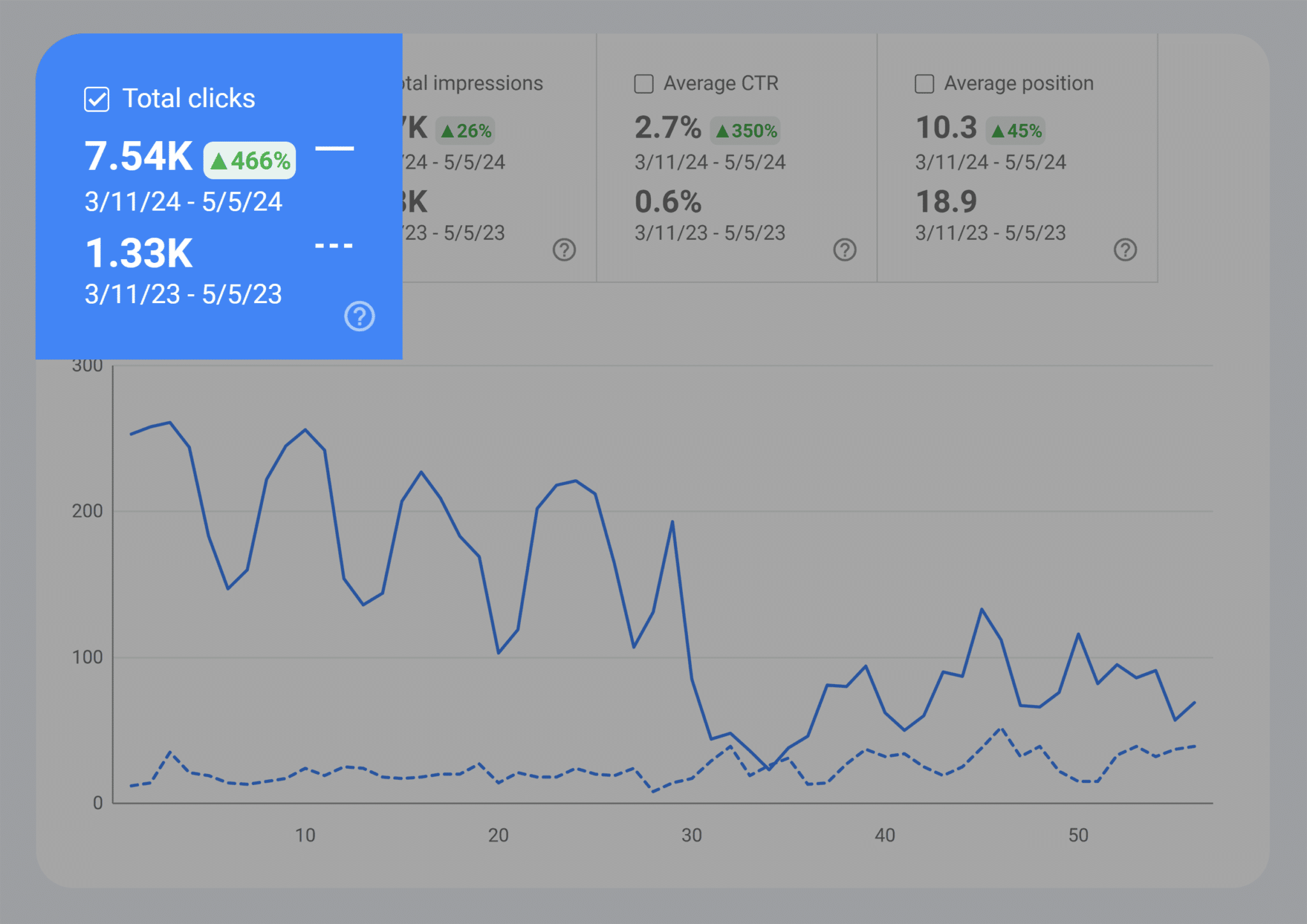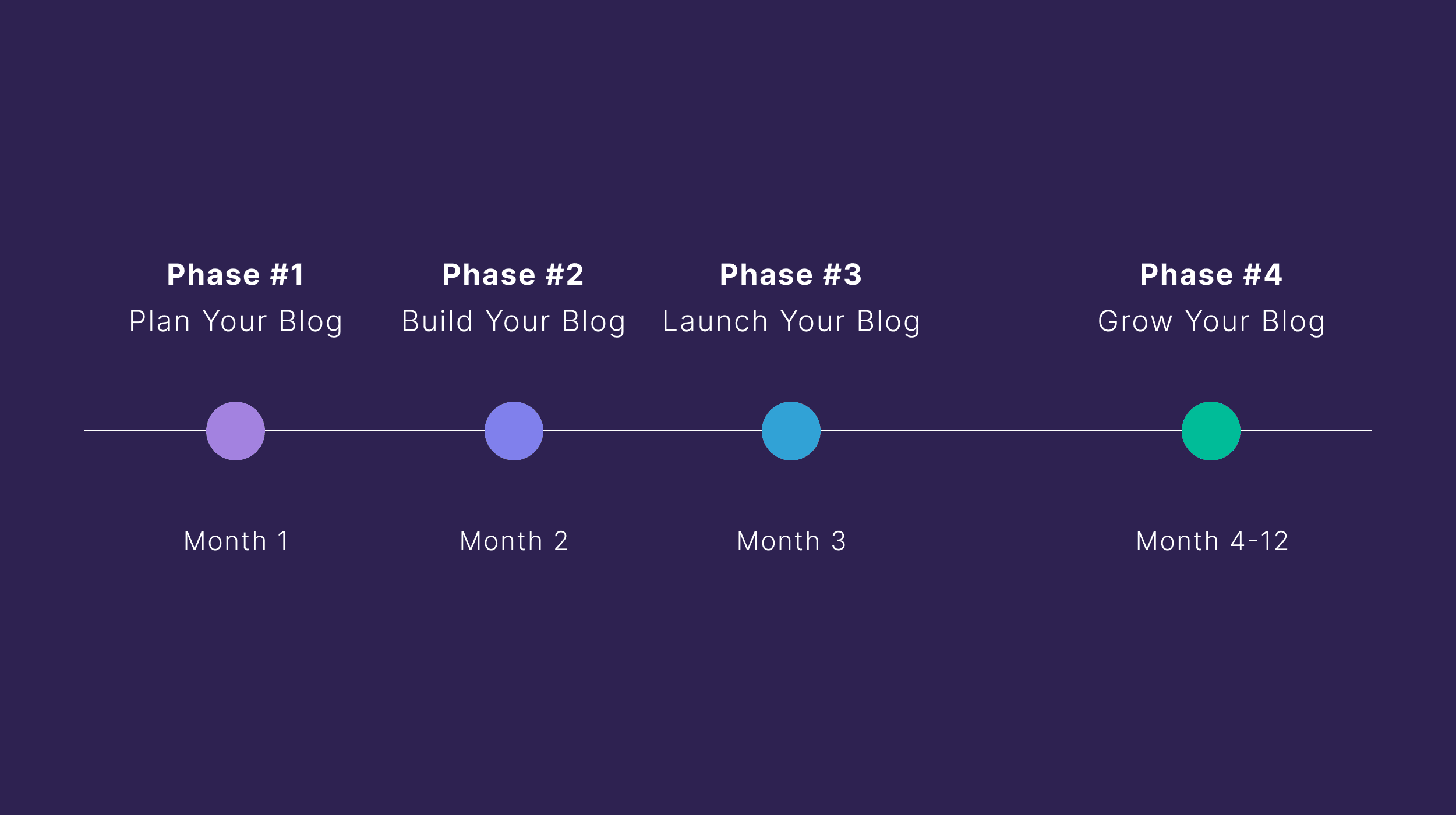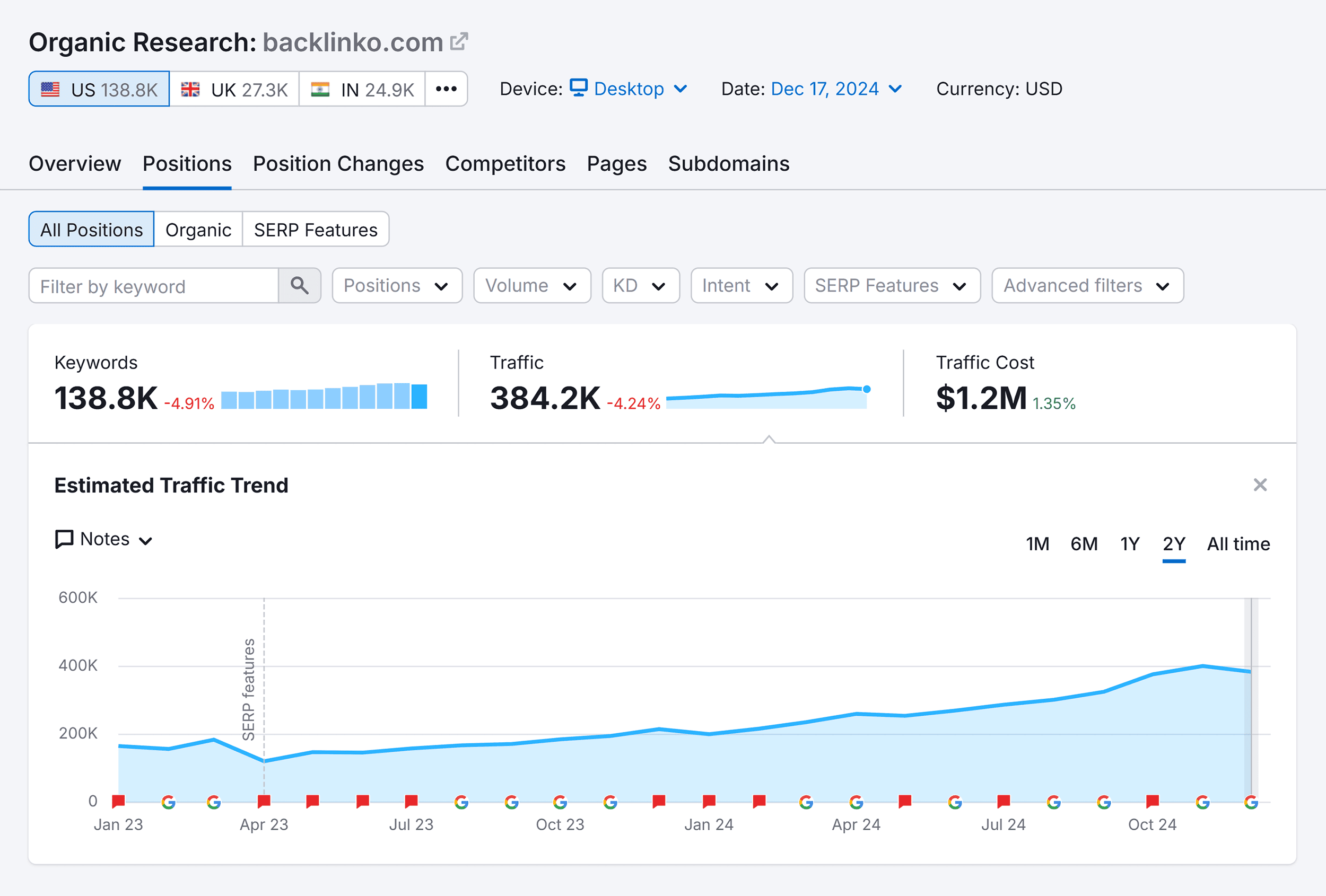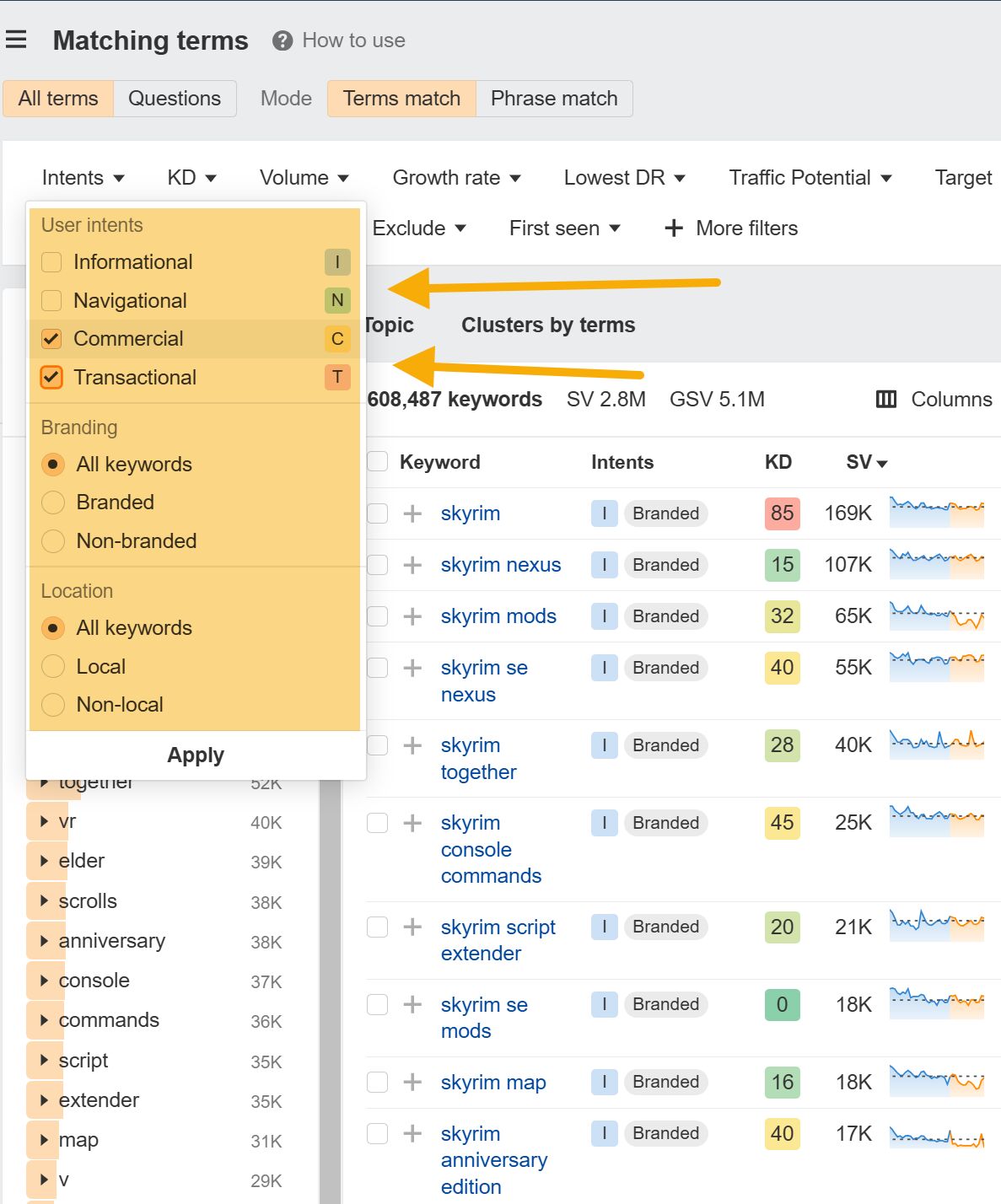Keyword cannibalization can negatively impact your website’s organic search performance.
But catching and fixing this issue can have the opposite effect.
Case in point: Two of our articles on Backlinko had cannibalization issues. So, we consolidated them with a 301 redirect.
And saw a 466% increase in clicks year over year.
Cannibalized pages undermine your SEO efforts. And may not appear in the top spots—no matter how good they are.
Don’t lose that precious real estate on organic search.
In this guide, we’ll teach you step-by-step how to identify and resolve keyword cannibalization issues. So you can improve your rankings and the user experience.
What Is Keyword Cannibalization?
Keyword cannibalization happens when two or more pages on your website target the same keyword(s) and fulfill a similar search intent.
The result?
Search engines have difficulty determining the most relevant and authoritative page for the target keyword.
Ultimately, all of these pages can get stuck in lower positions in search results.
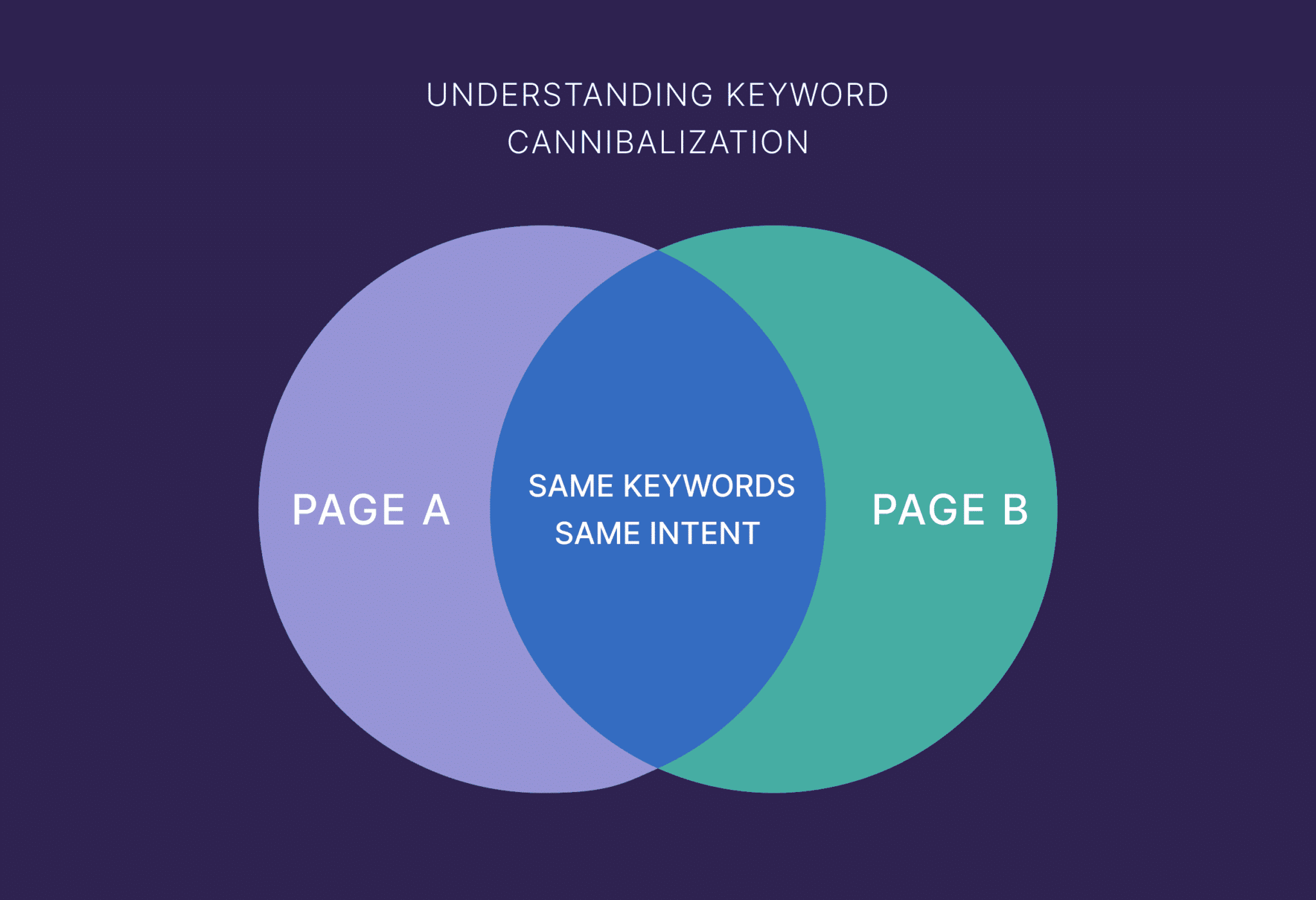
Keyword cannibalization can hurt your site’s organic performance because it:
- Reduces search visibility and organic traffic, which can affect conversions
- Dilutes ranking potential by distributing authority signals between these pages
- Frustrates users with similar information or duplicate content spread across multiple pages
Let’s take a deeper look at the cannibalization example from our site—that we mentioned earlier.
We had two older articles on the same topic: the best free and paid SEO tools.
The oldest article targeted “SEO tools” and featured an extensive (albeit overwhelming) list of options:
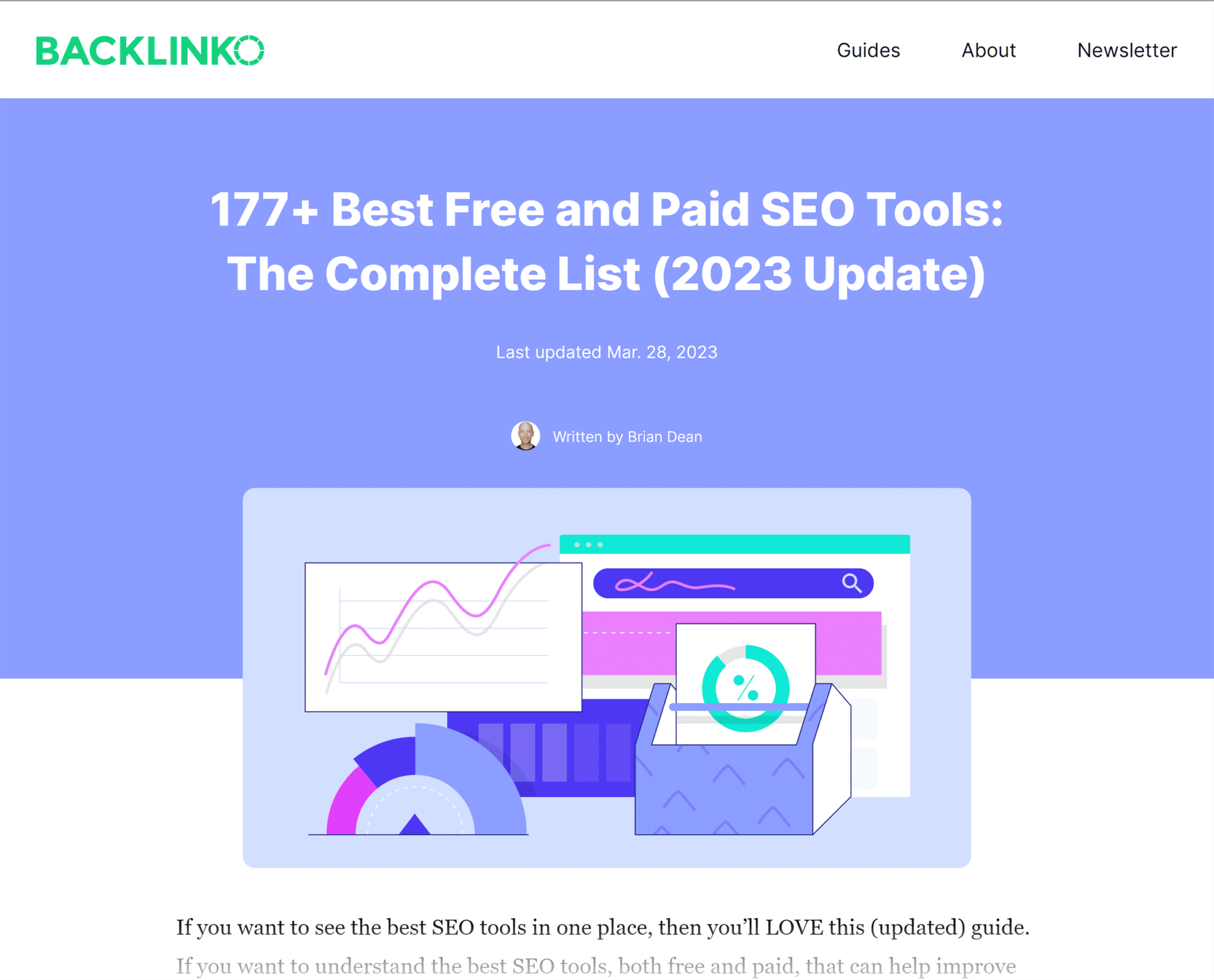
The more recent article targeted “best free SEO tools.” And featured a shorter (but still significant) number of tools.
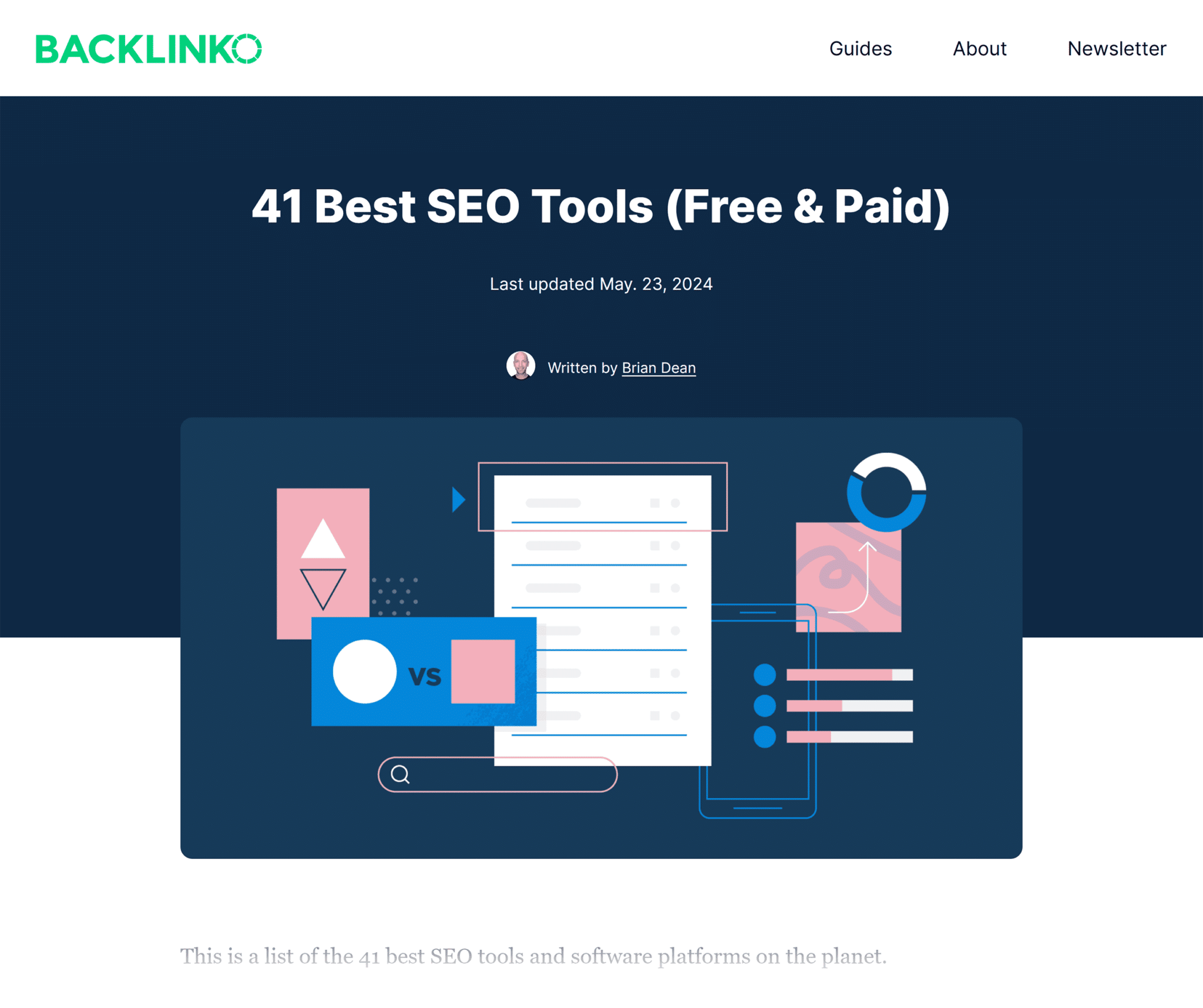
Both pieces targeted queries related to SEO tools and fulfilled a similar search intent (people exploring SEO tools).
But they were getting significantly different results.
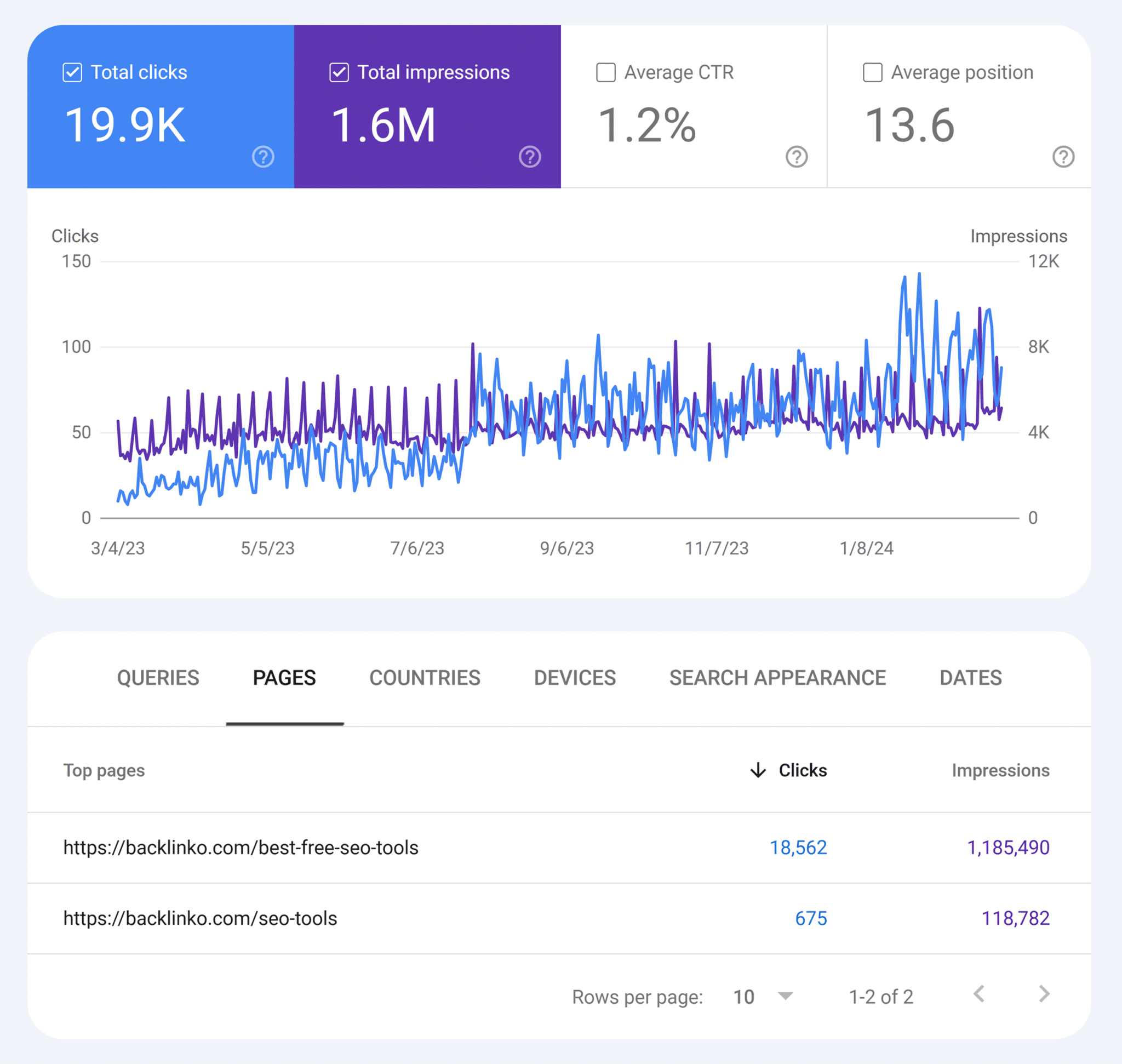
We researched both articles and noticed that the “free SEO tools” article received notably more impressions and clicks.
The uneven distribution of traffic indicated cannibalization.
It was also clear that the format of the older “SEO tools” article was no longer resonating with our audience. The lengthy list of tools was overwhelming, which is another reason why the competing article received more clicks.
So, we decided a 301 redirect was in order.
After consolidating the URLS, it didn’t take long to see an improvement. In the eight-week period following the launch, traffic increased by 466% compared to the previous year.
This impressive increase was low effort for our team but high impact for our site.
In fact, we’re still seeing a net increase over time by doing nothing other than redirecting an underperforming page.
What Keyword Cannibalization Is Not
Let’s recap. Keyword cannibalization happens when two or more pages:
- Target the same keyword(s)
- Fulfill the same or similar search intent
But what if these pages target hundreds of keywords and only a few terms overlap? Or if pages targeting similar keywords cater to different search intents?
In such cases, keyword cannibalization is less likely to be a significant issue. But we recommend regularly monitoring these pages for optimal search performance.
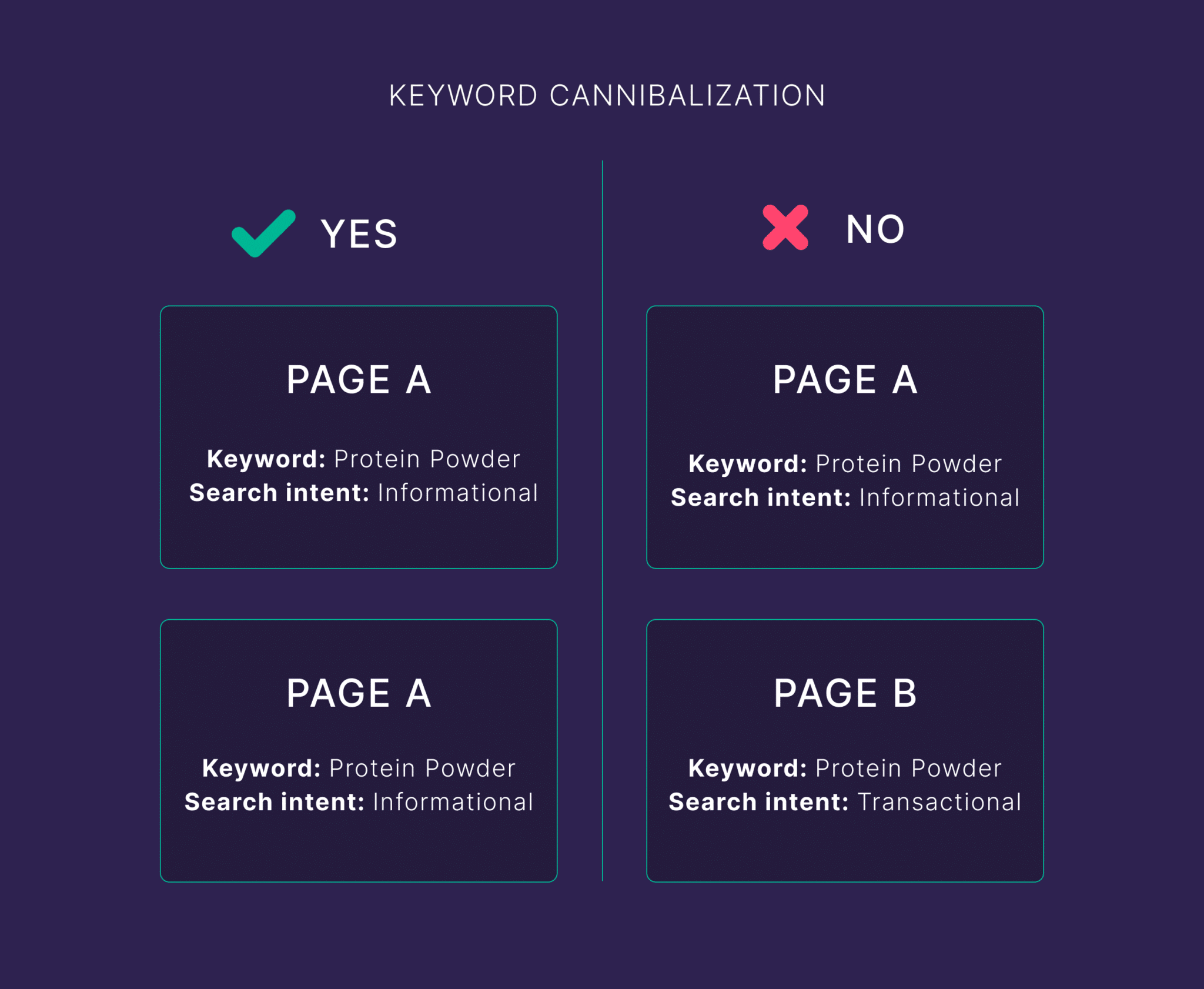
For example, the wellness site Health has multiple pages for the keyword “protein powder.”
On a closer look, each page fulfills a different search intent and targets various keywords:
- Can Protein Powder Make You Gain Weight?: Serves an informational intent with factual details about consuming protein powder. And targets keywords like protein powder and weight gain.
- The 11 Best Tasting Protein Shakes: Serves a transactional intent with a list of products and targets keywords like protein shakes and protein supplements
- Is Protein Good for You?: Serves an informational intent with a nutritional breakdown of protein powder. Targets keywords like plant-based protein and protein powder nutrition.
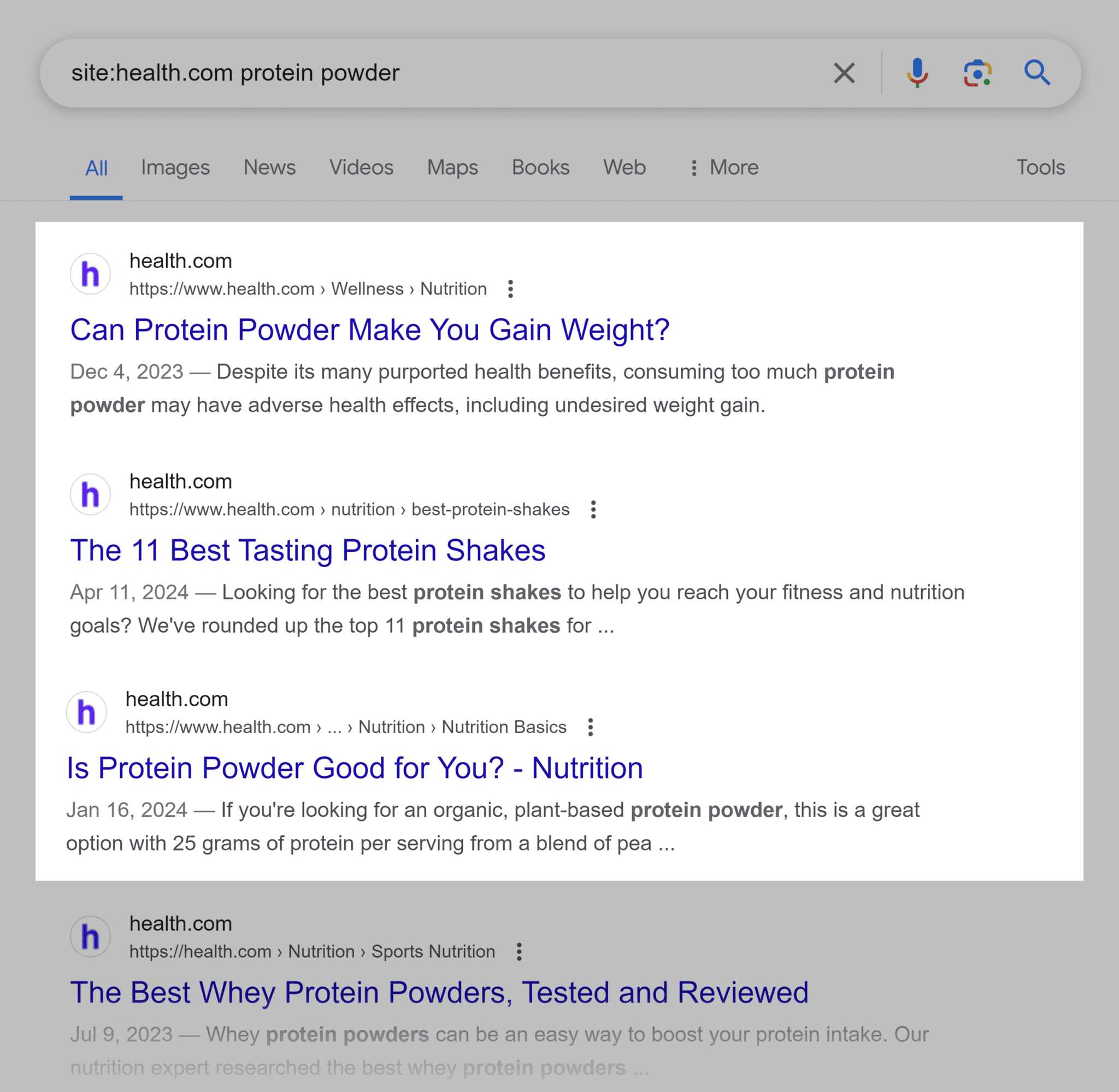
So, even if these pages don’t appear in the search results for “protein powder,” it’s likely not due to keyword cannibalization. Because other pages target and rank for various keywords related to “protein powder.”
Put simply, all these pages don’t fight each other for search traffic.
Instead, they enhance the site’s search visibility for a broader set of keywords. That’s why it’s not a case of keyword cannibalization.
How Keyword Cannibalization Impacts SEO
Let’s break down the impact of keyword cannibalization on your website’s SEO.
Low Rankings and Traffic
Dipping traffic is one of the most common indicators of keyword cannibalization.
Why?
Because cannibalization can negatively impact your organic search positions.
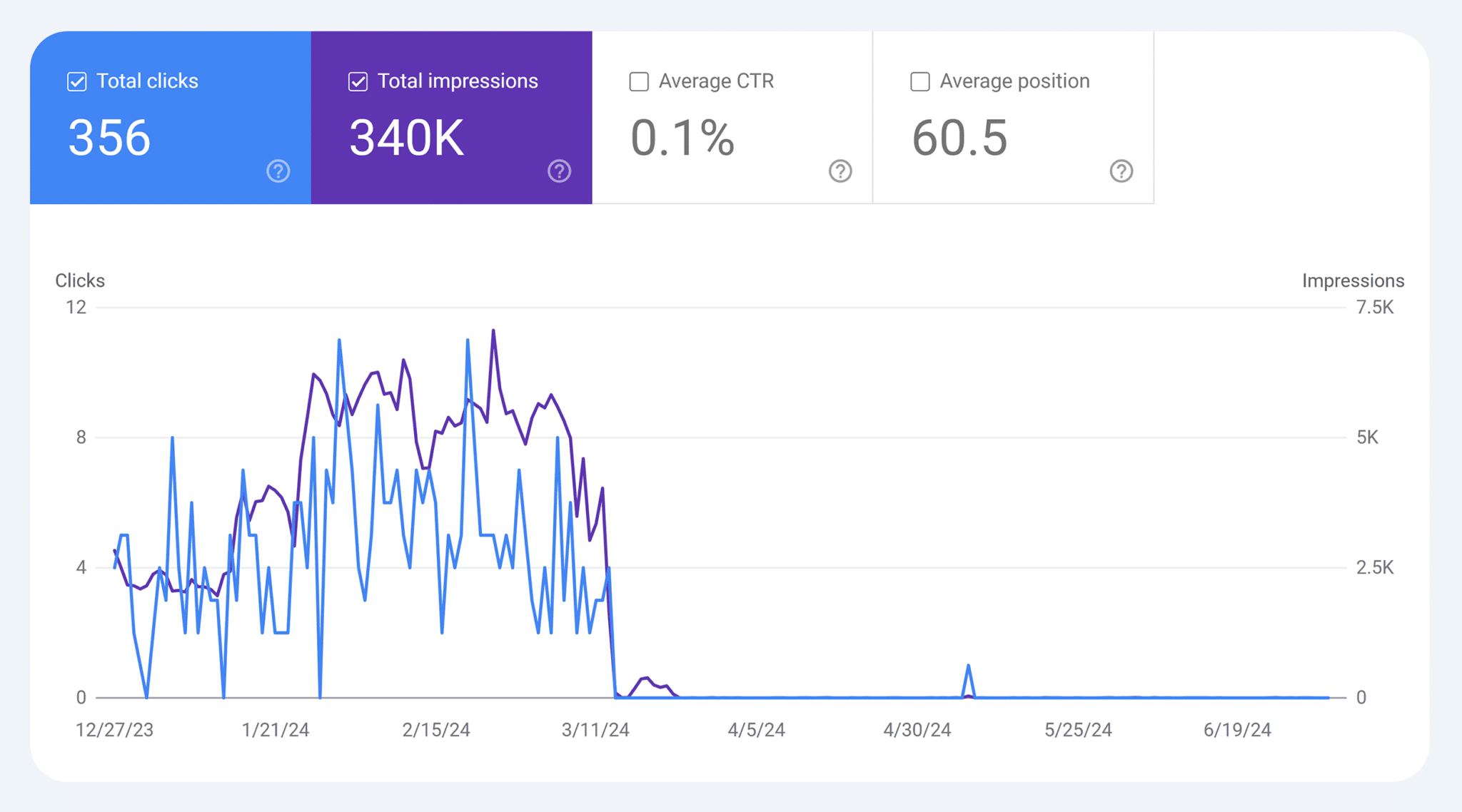
When multiple pages compete for the same keyword, it becomes difficult for search engines to figure out the most relevant page to rank for this keyword.
This can lead to lower search rankings and less visibility for all concerned pages.
Reduced Page Authority
Search engines rank pages based on authority signals, like backlinks, content quality, user experience, and more.
In cases of keyword cannibalization, these authority signals are divided between multiple pages. That means you have several low-authority pages rather than one highly authoritative page.
This distributed authority makes it difficult for your pages to outrank other high-authority pages in the search results.
For example, the following article by MoEngage ranks outside the top 10 results for the keyword “email marketing tactics.”
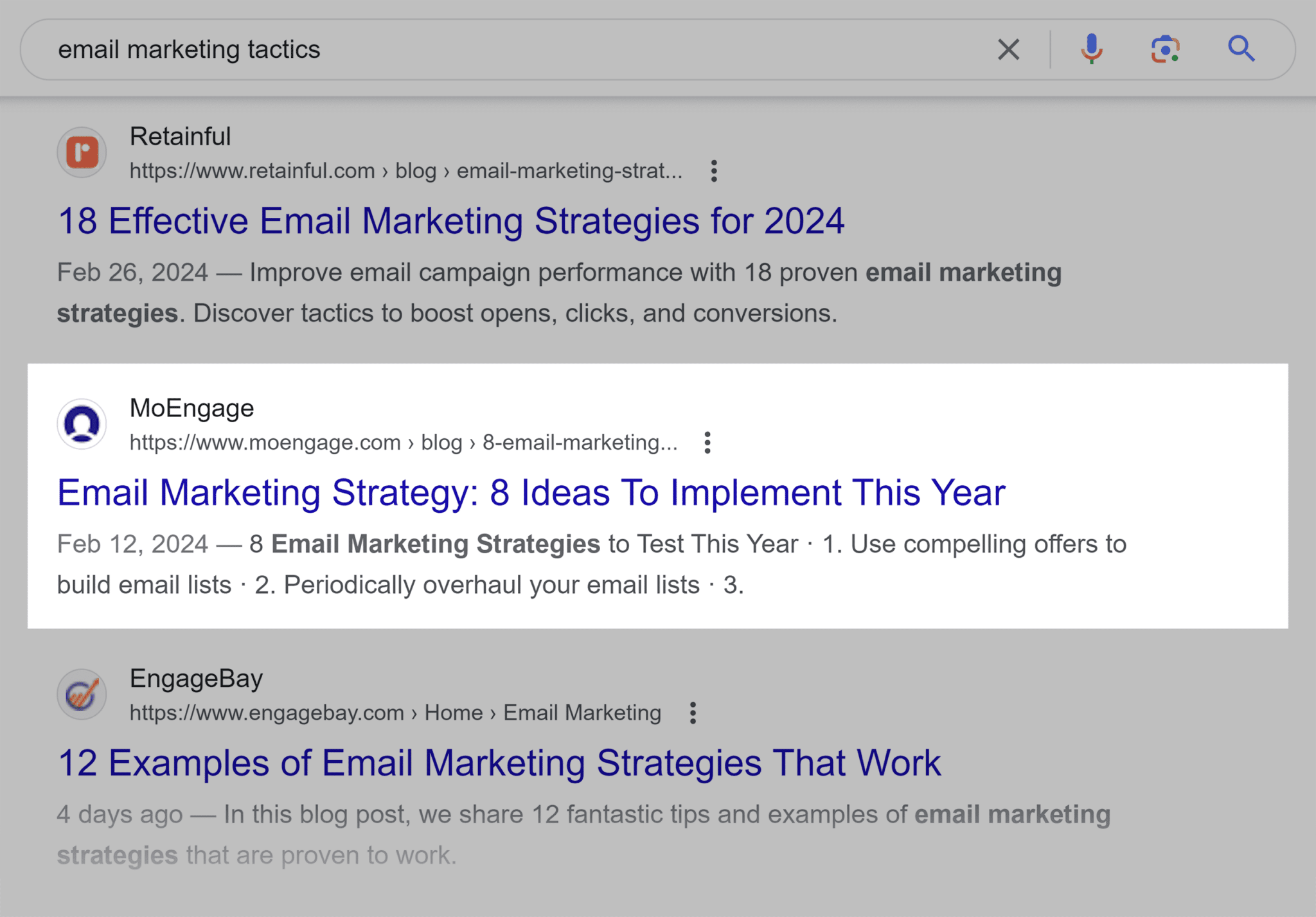
The article is well structured and has actionable tips, expert insights, and a webinar.
But doesn’t currently rank among the top search results.
This might be because the website has multiple pages optimized for the same keyword and search intent. Causing authority to be distributed across several pages targeting the same keyword.
And potentially leading to lower rankings.
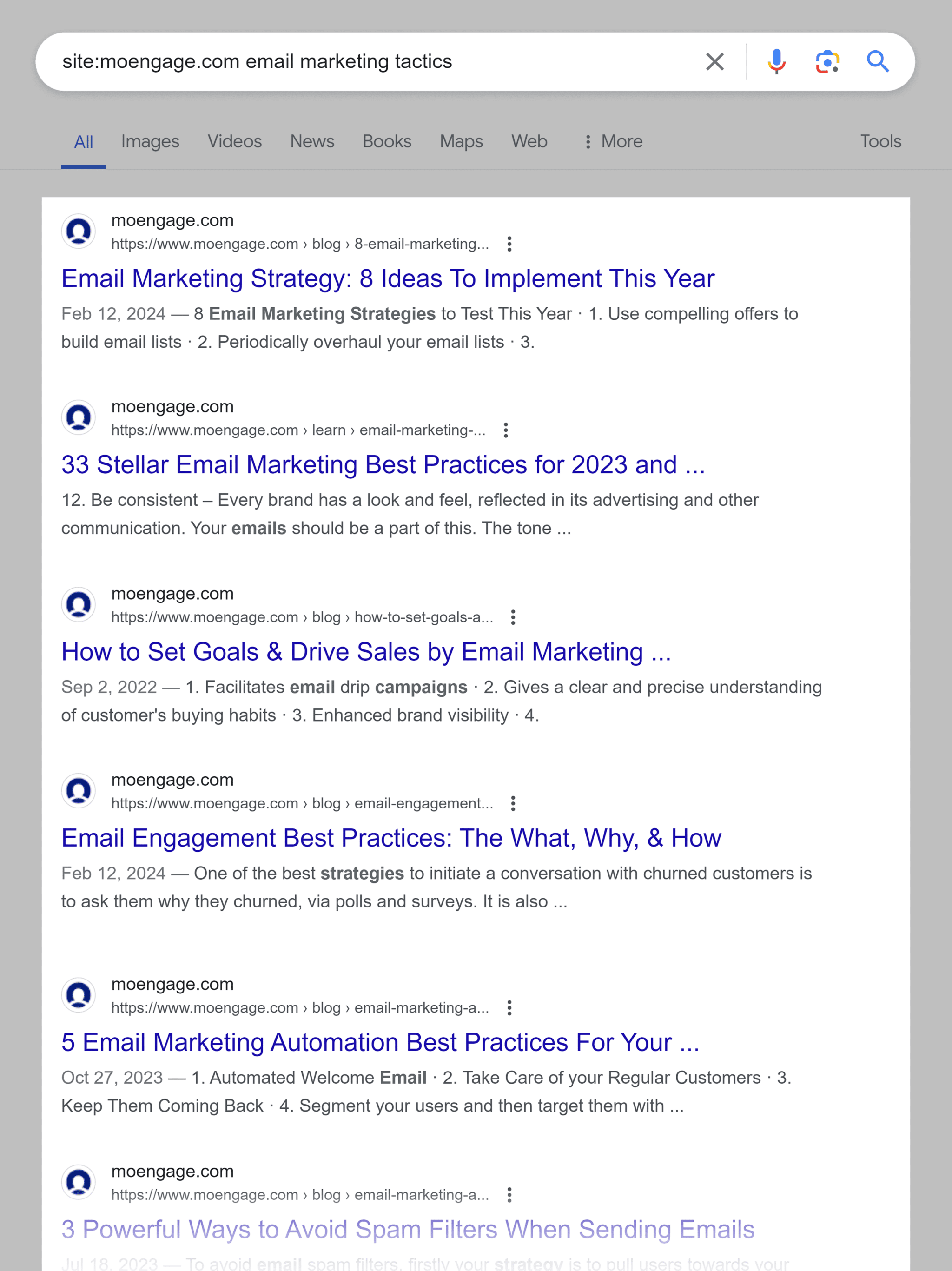
Distributed Internal Links
Internal links distribute authority across different pages on your website. When keyword cannibalization happens, internal links are spread across multiple pages.
Instead of linking to one page for relevant anchor text across your site, you have to selectively link different pages in every location.
For example, let’s consider a project management SaaS company with multiple pages for the keyword “task management.”
- Blog A: www.manageprojects.com/blog/task-management-tips
- Blog B: www.manageprojects.com/blog/task-management-advice
- Feature page: www.manageprojects.com/product/task-management
Instead of creating multiple internal links for one page with the anchor text of “task management,” you’d need to distribute internal links across all three pages.
This fragmented linking structure can reduce each page’s authority and relevance signals.
Users also rely on internal links to find relevant content on a site. Linking different pages with similar anchor text can confuse users or lead them to pages that don’t satisfy their search intent.
Poor Conversion Rates
Keyword cannibalization can hurt your website’s user experience.
Multiple pages created for the same or similar topic can overwhelm users. They won’t know which one contains the most up-to-date or comprehensive information. And not every visitor will have the time or patience to read each page to find out.
This can also diminish their trust in your content’s quality.
The result?
High bounce rate and low conversions.
For example, Scribe, a documentation tool, has created multiple articles and pages about writing and building SOPs. These articles present handy tips and offer a wide selection of templates, helping readers get started quickly.
But since these pages cover very similar topics, readers may be confused about which page has the best information.
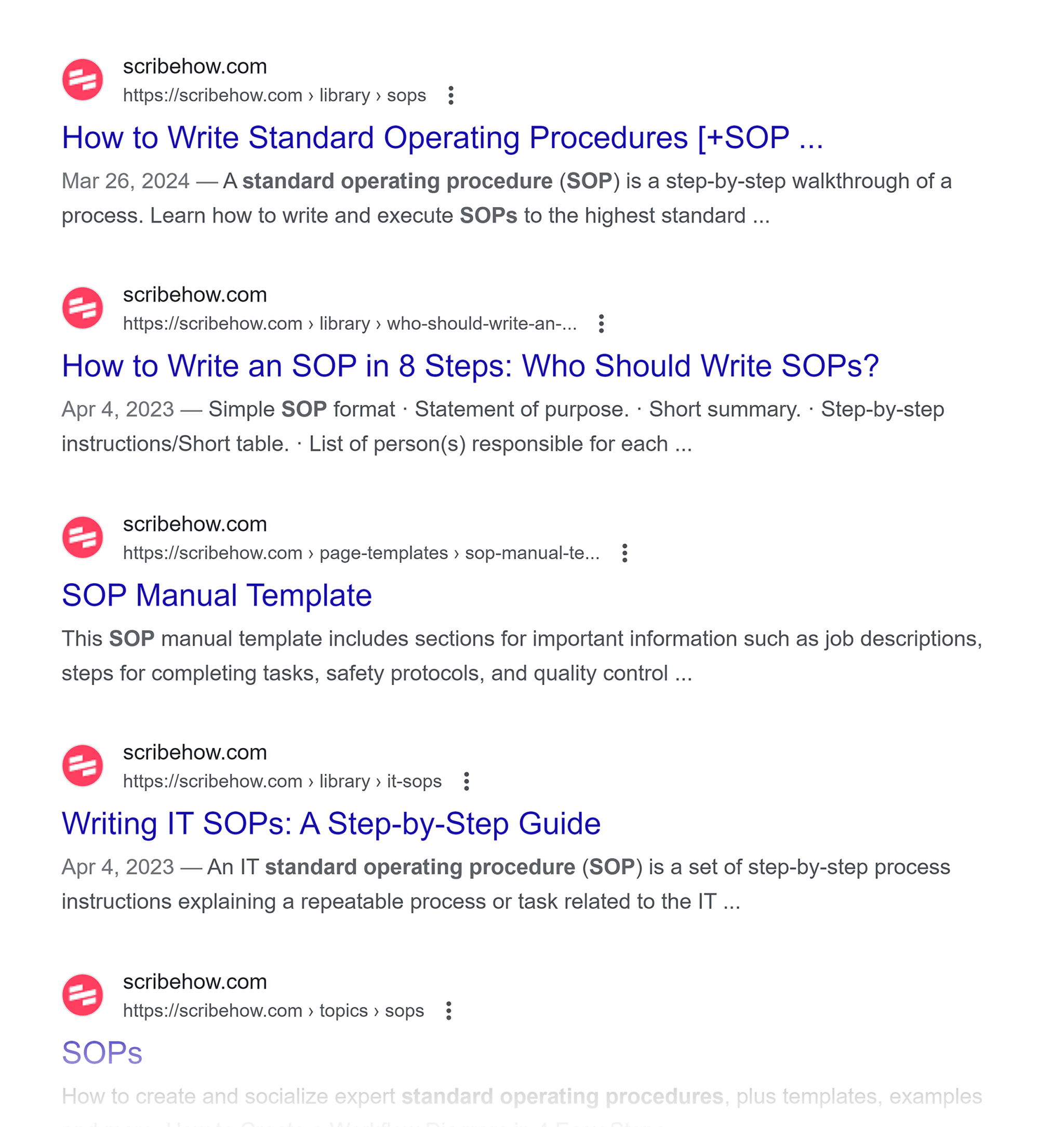
Wasted Crawl Budget
Search engines allocate a limited budget to crawl your website. When you have several instances of keyword cannibalization, you waste this crawl budget on similar pages around the same keyword rather than focusing on unique content.
Wasting your crawl budget can prevent search engines from indexing more important pages and negatively impact search rankings.
When Cannibalization Is Not Problematic
Keyword cannibalization doesn’t hurt your organic search performance when you create multiple pages for the following reasons:
Different Locations
If you create multiple pages targeting the same keyword(s) and different locations, these pages shouldn’t cannibalize each other because they’re geared to different audiences.
Ensure each page’s content is unique to avoid duplicate content issues.
For example, this furniture rental company has created several service pages with the same keywords for multiple locations.
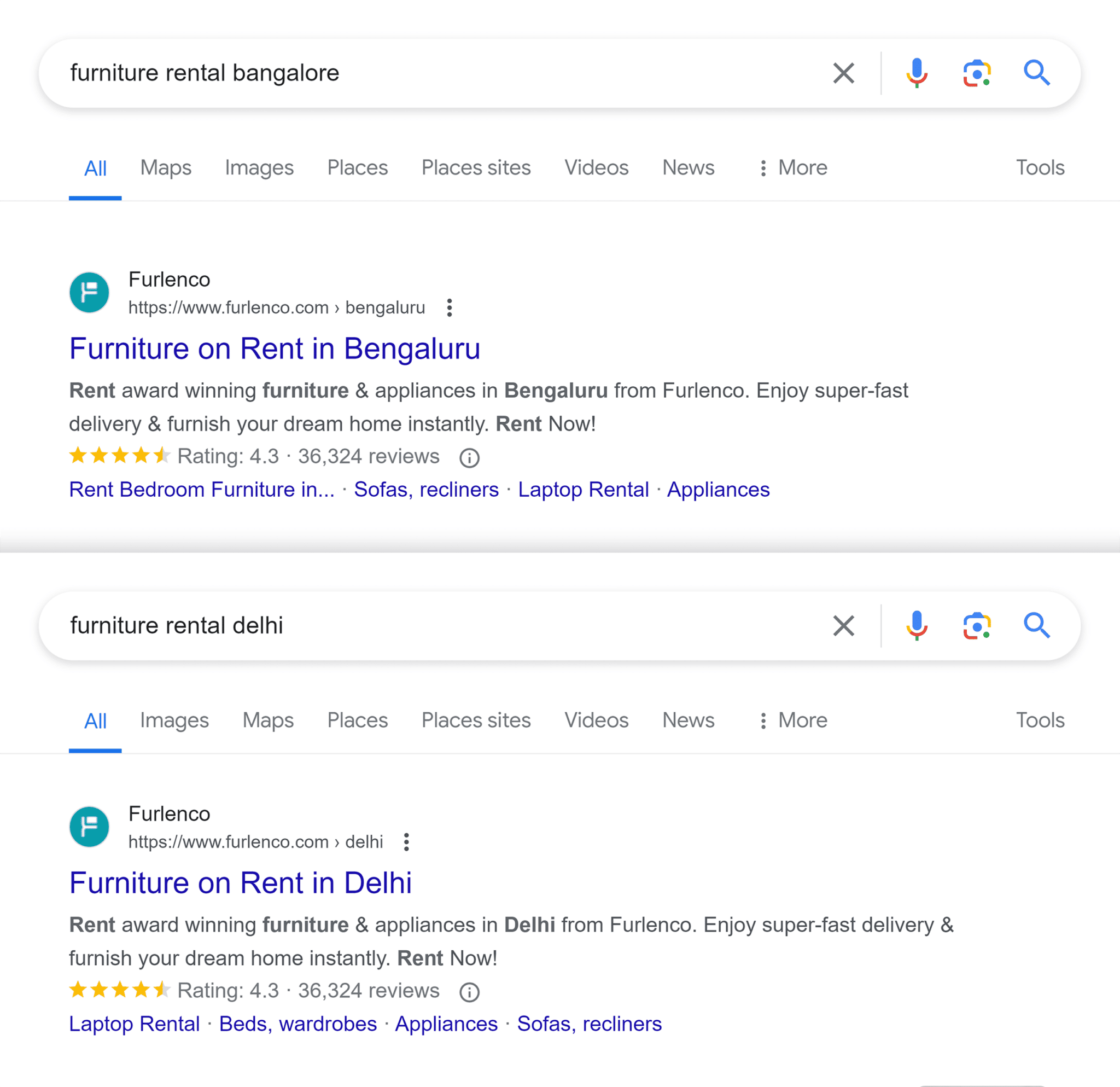
Varied Search Intents
You shouldn’t face a cannibalization issue if each page fulfills a unique search intent. This means you can create multiple pages covering similar topics but varied search intents.
For example, Nuclino has several pages for the keyword “project management software.”
Each page focuses on a different search intent, such as game development, planning, creative management, and more.
Some pages have a transactional intent, while others have an informational intent.
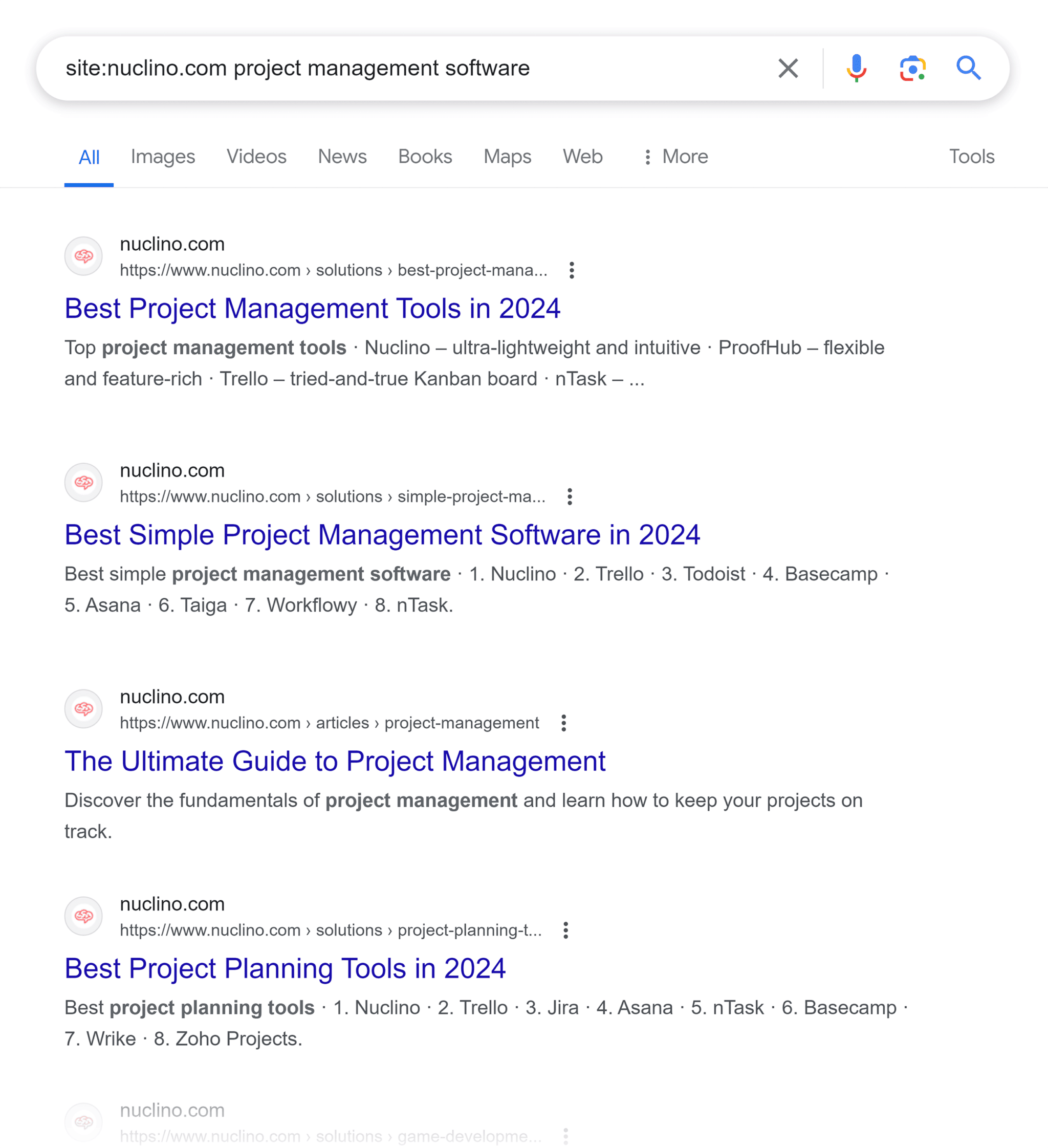
How to Identify Cannibalization Issues
When left unchecked, keyword cannibalization can become a roadblock for your SEO strategy. Let’s learn different ways to actively identify cannibalization issues.
Google Search Console
Google Search Console (GSC) is a free tool to stay on top of your SEO health and identify cannibalization issues.
Sign into your GSC account and go to “Search Results” under the “Performance” section.
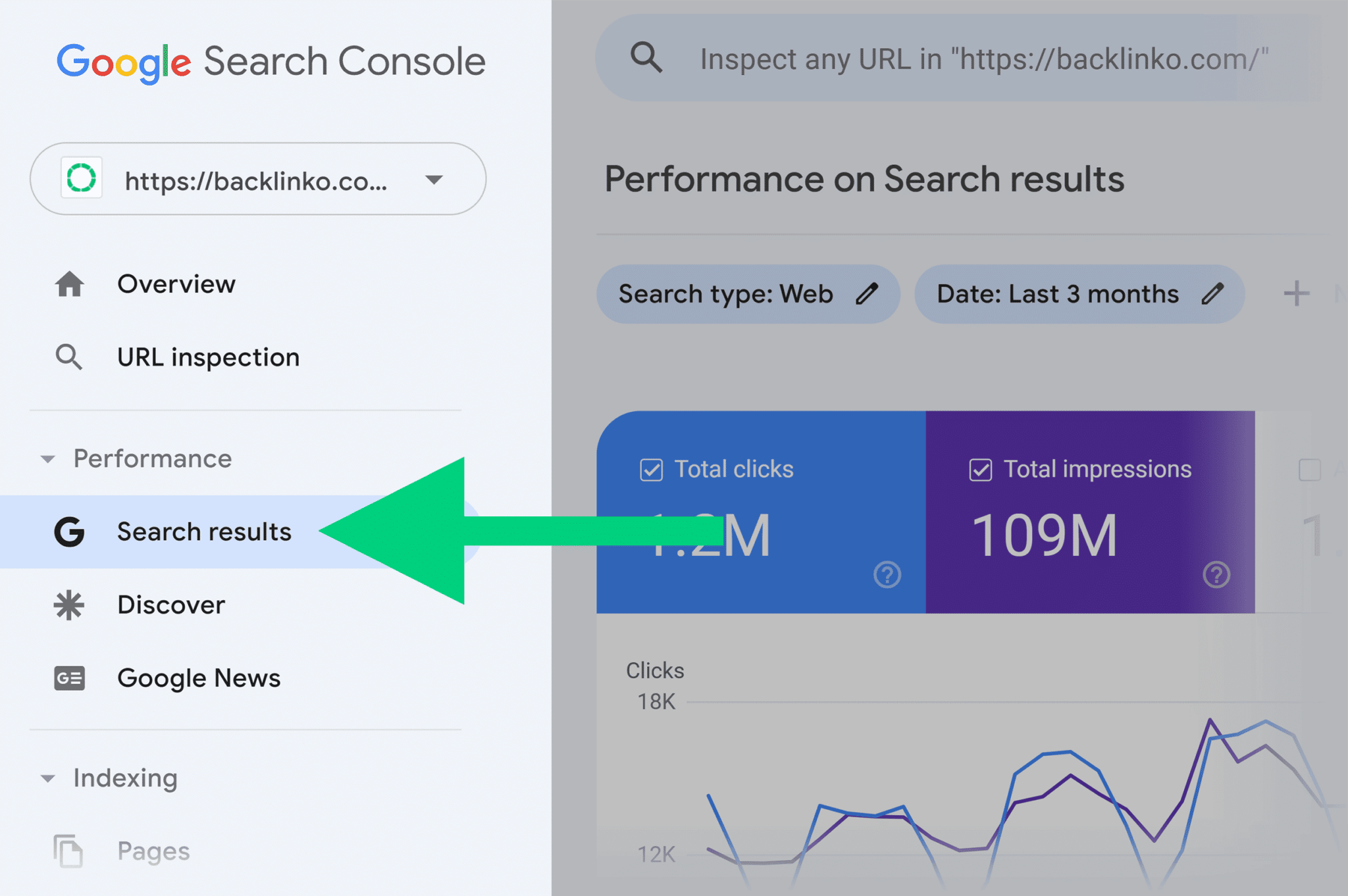
You’ll see a list of keywords that have brought impressions and clicks to your site. Click on any of these keywords to see impressions and clicks specifically for this keyword.
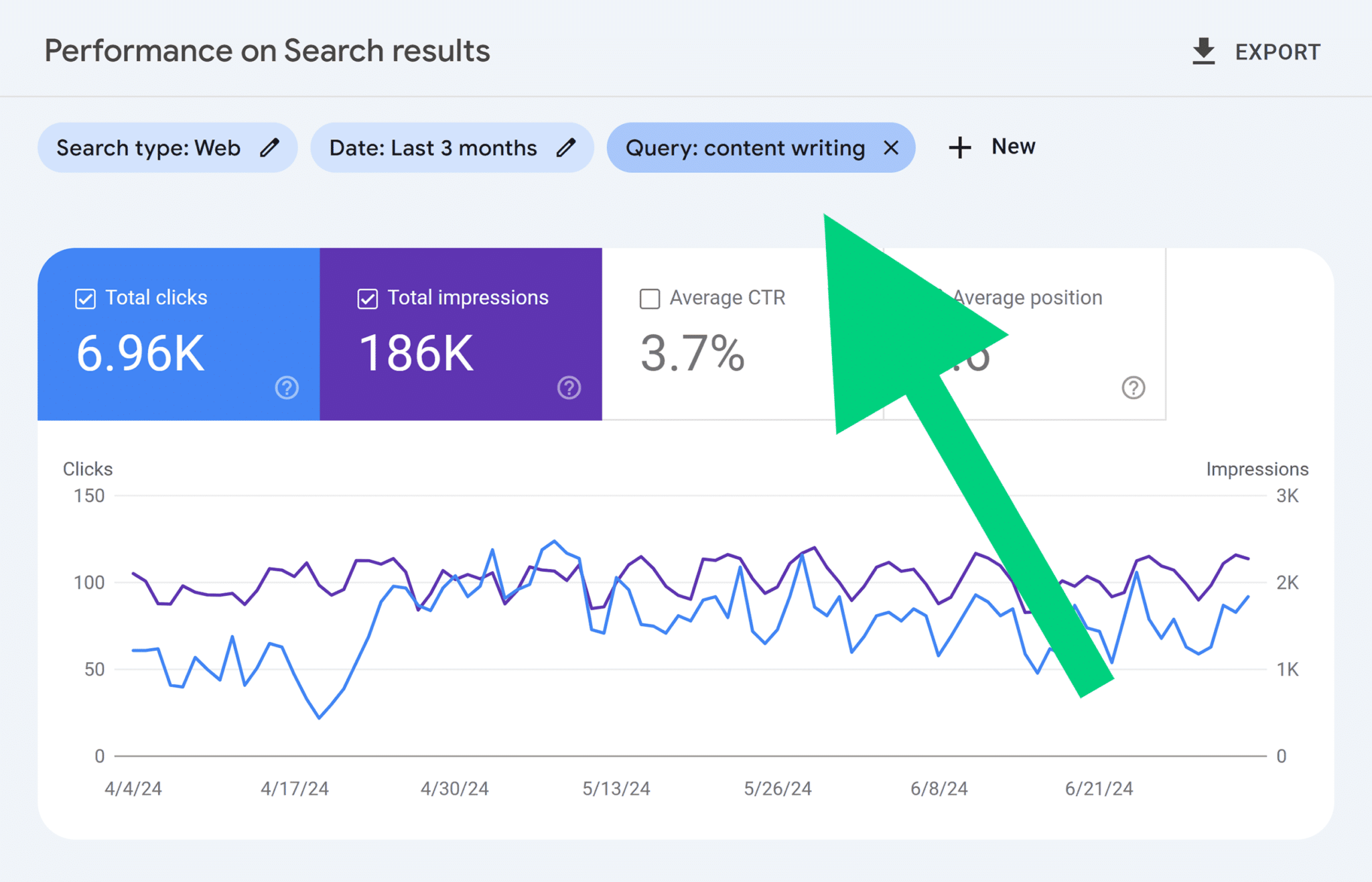
Go to the “PAGES” tab to find the pages associated with this keyword.
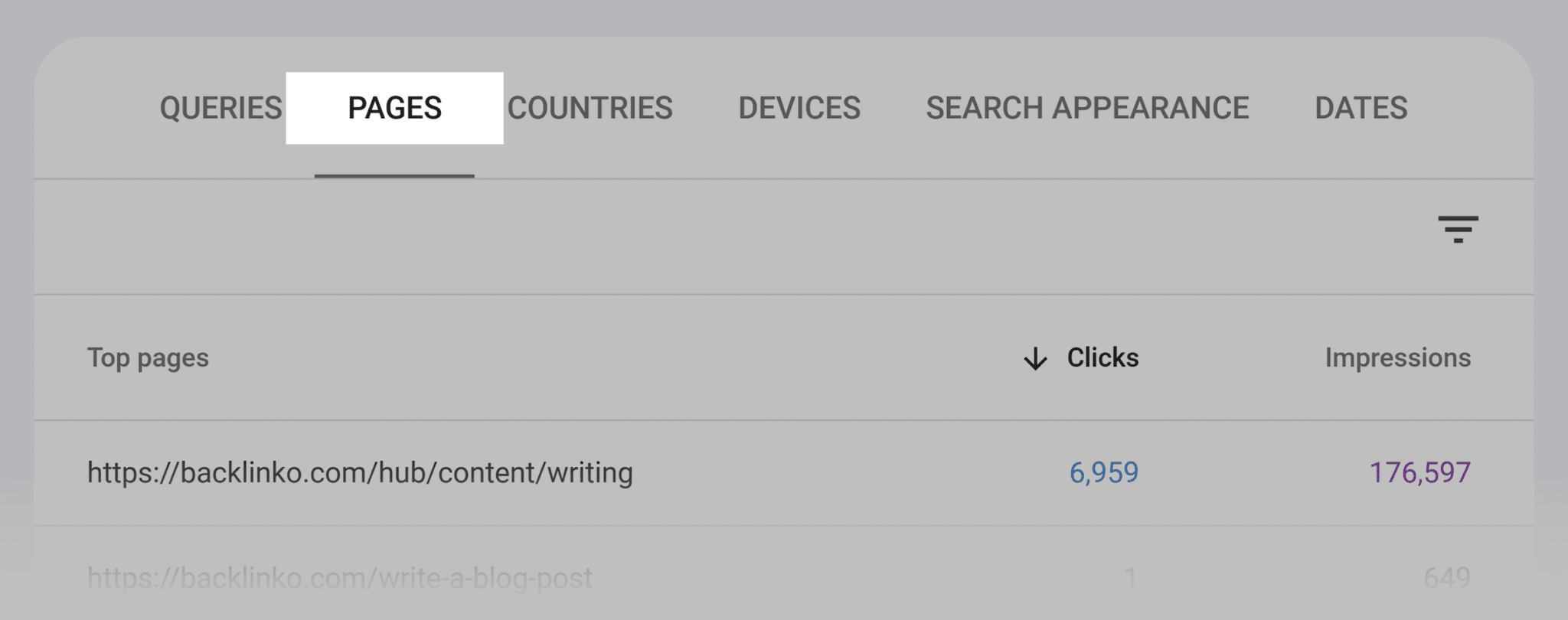
If you find more than one page listed for a query, it could be a cannibalization issue. Evaluate each page’s monthly traffic and search rankings to see if they’re cannibalizing each other.
For example, in this scenario, the first article is doing well, while the other articles aren’t performing great.
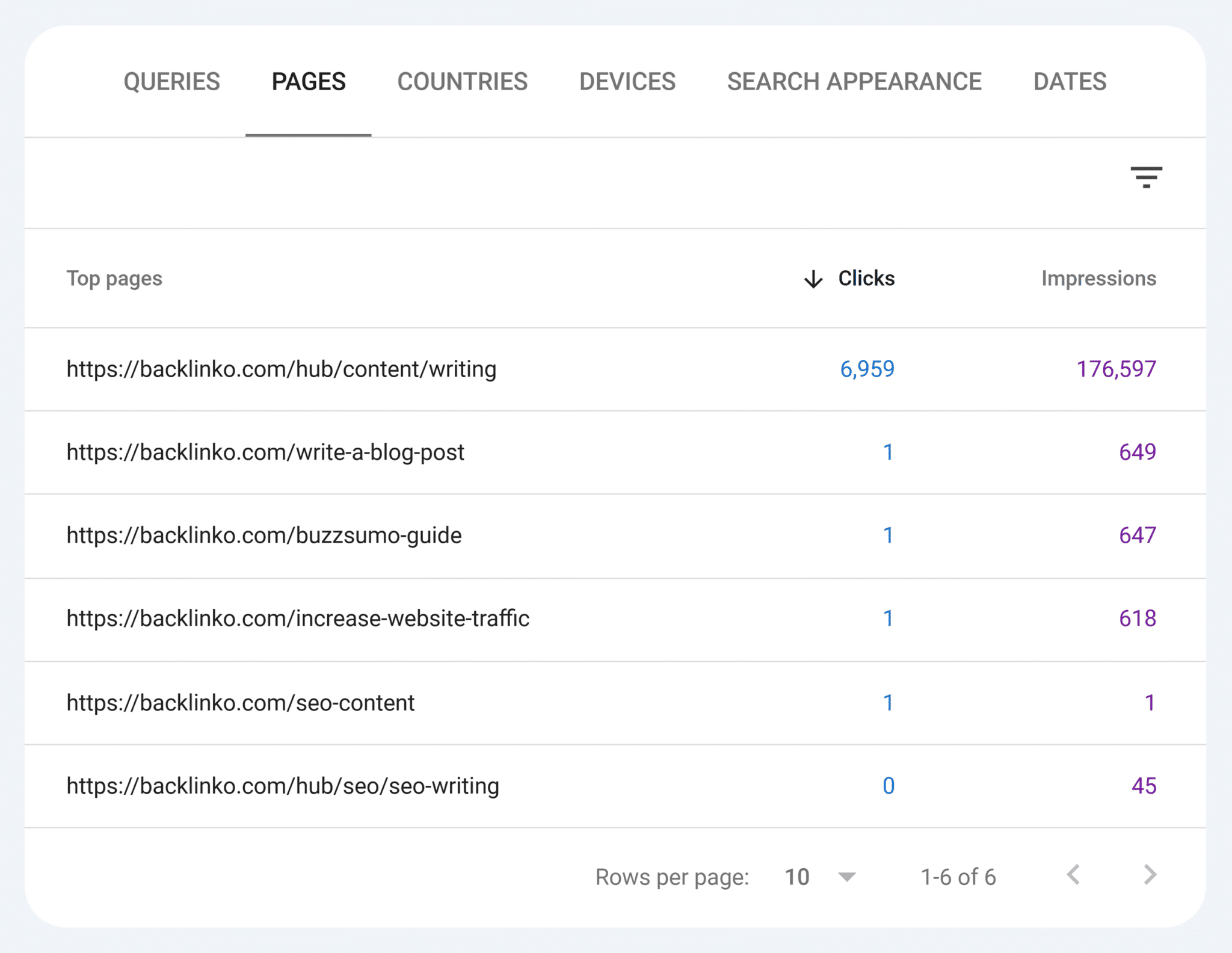
Review each page’s intent to determine if there’s a cannibalization issue.
You can also check the average position for these pages. Dropping or fluctuating positions is a sign of cannibalization because search engines are likely switching the rankings for these pages.
Semrush’s Cannibalization Report
Semrush’s Position Tracking tool monitors your website’s SEO performance and page rankings. Access its Cannibalization Report to quickly identify pages and keywords that might be cannibalizing each other.
Enter your website domain and click “Set up tracking” to get started.
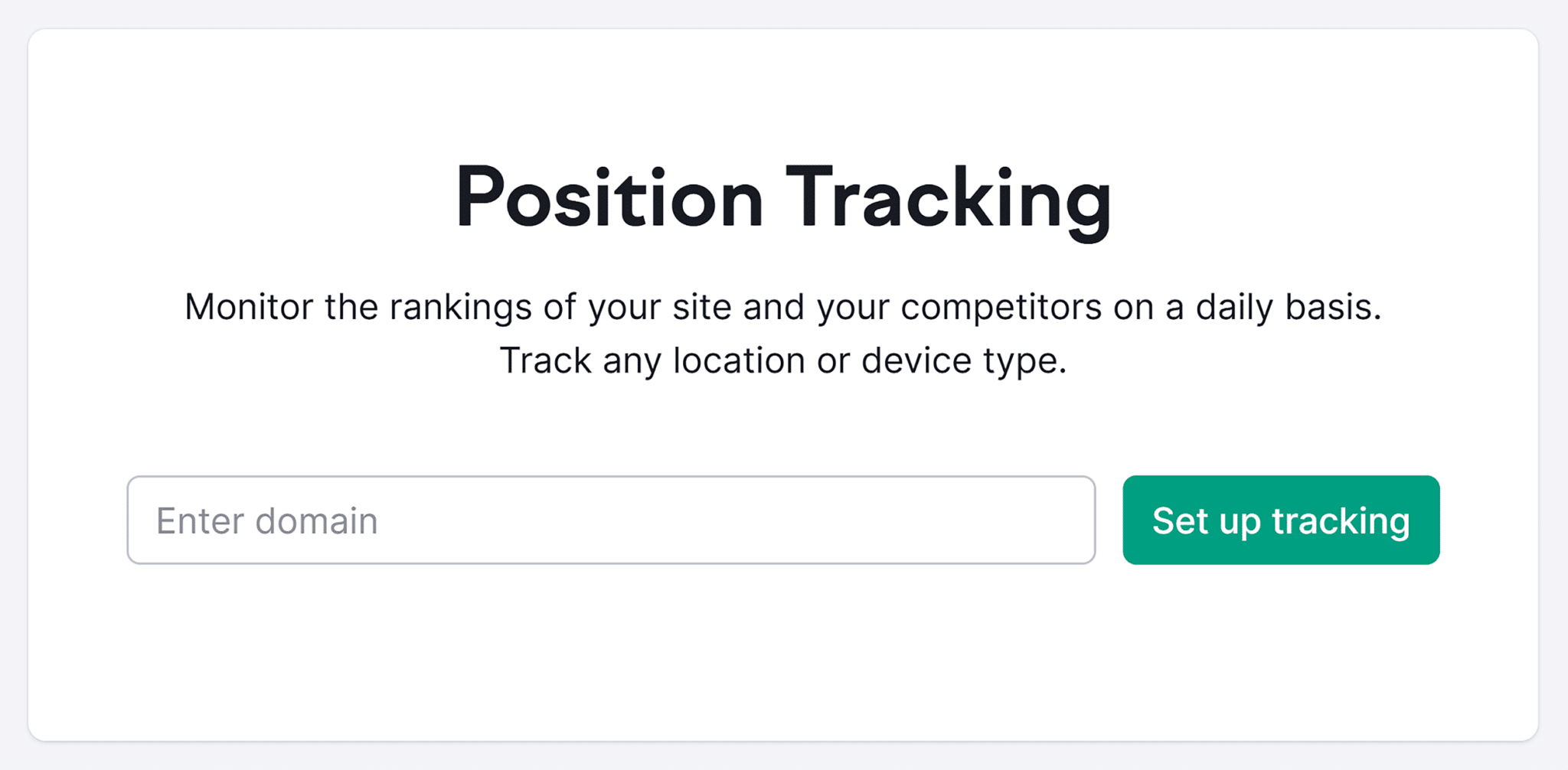
Then, add the location where you want to monitor your performance and choose other parameters like search engine, device, and language.
Click “Continue To Keywords” when you’re done.
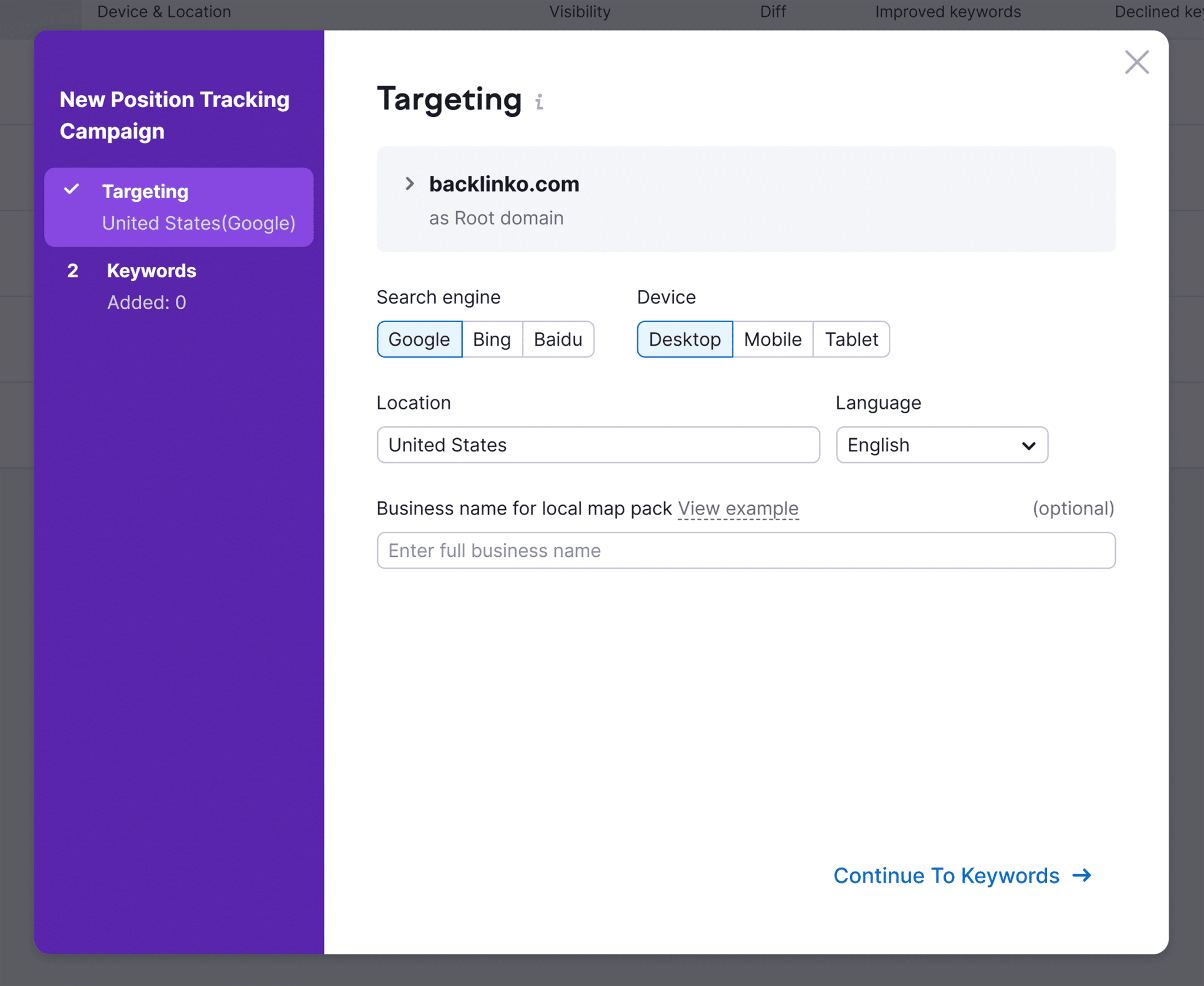
This is where you can add your target keywords by:
- Manually pasting keywords in the box
- Using “Import from…” to add from Google Analytics
- Getting keyword suggestions from Semrush
Once you’ve added all keywords, hit “Add keywords to campaign” and “Start Tracking.”
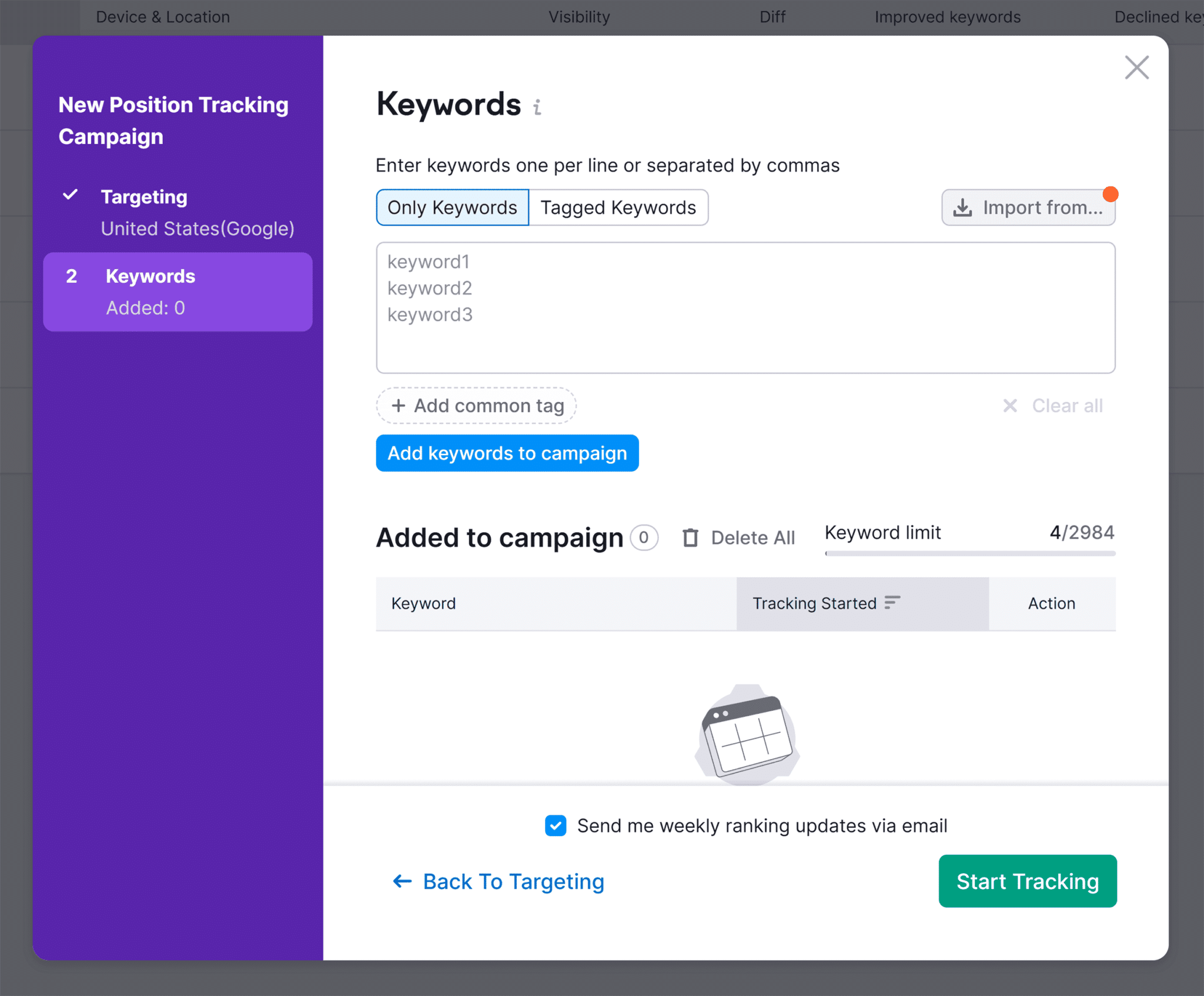
The report may take some time to populate.
When it’s ready, head to the “Cannibalization” tab to see insights related to keyword cannibalization.
Here, you’ll find cannibalized pages that rank for the same keywords as one or more pages.
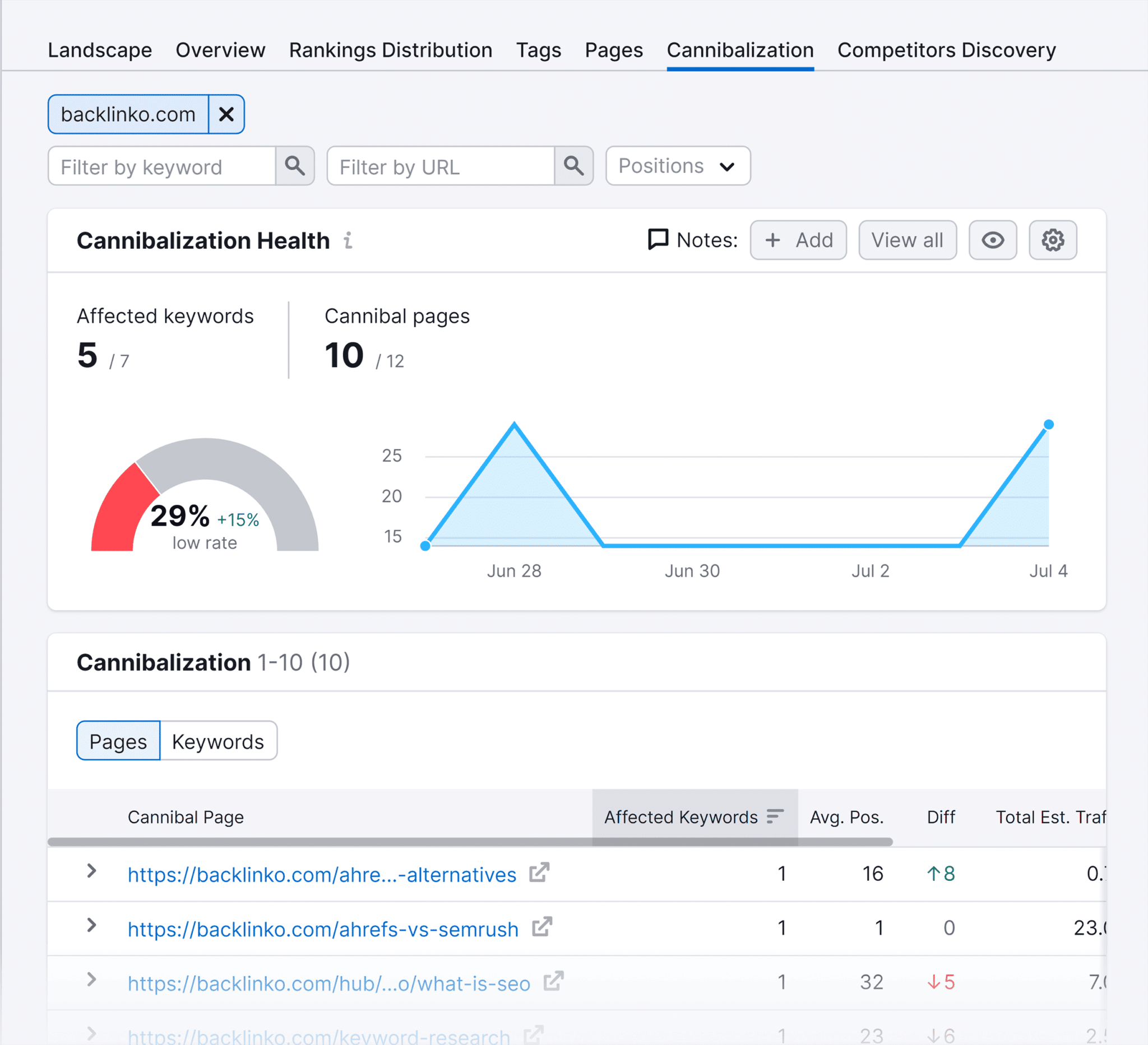
Click on the “Keywords” section for a breakdown of cannibalized pages by keyword.
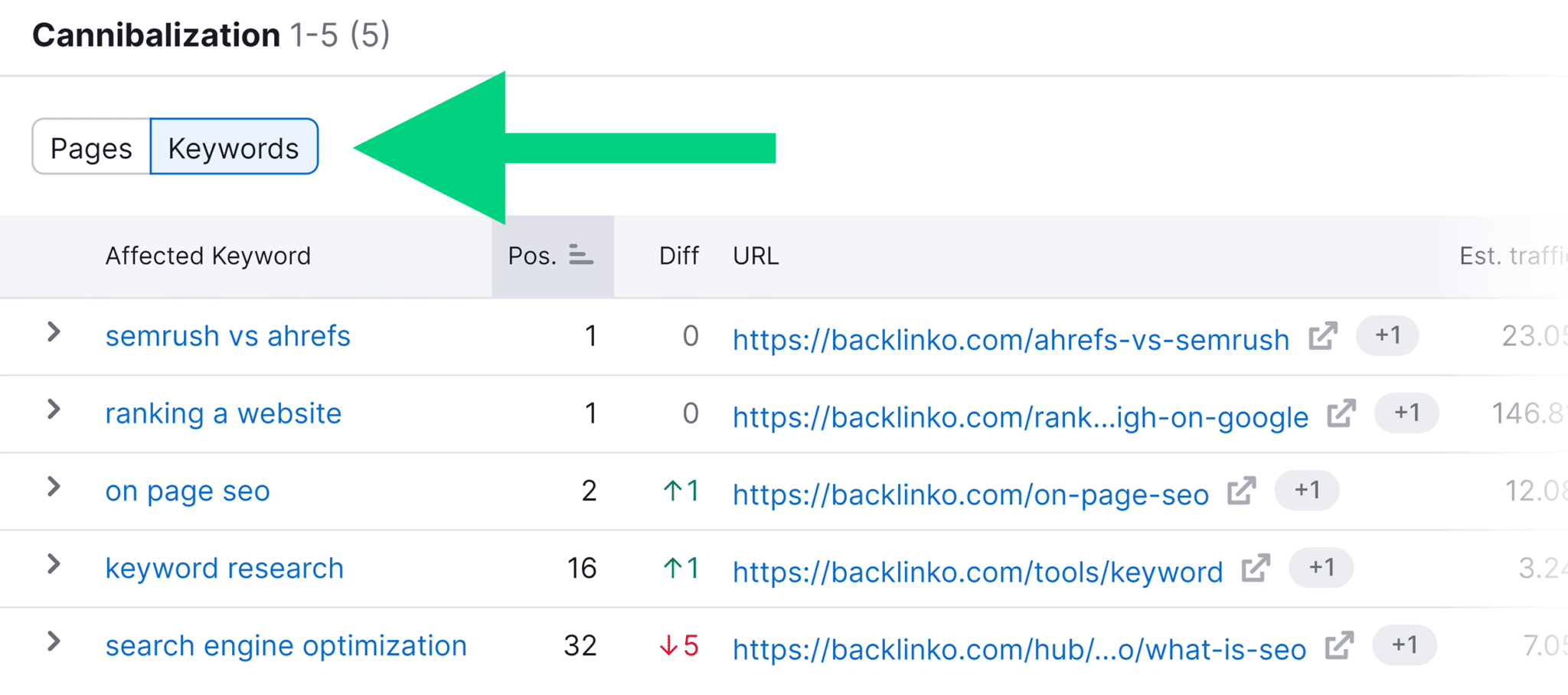
When you expand the results for a specific keyword, you can see rankings for individual pages associated with this keyword.
The graph also shows the varying search volume for this keyword over time.
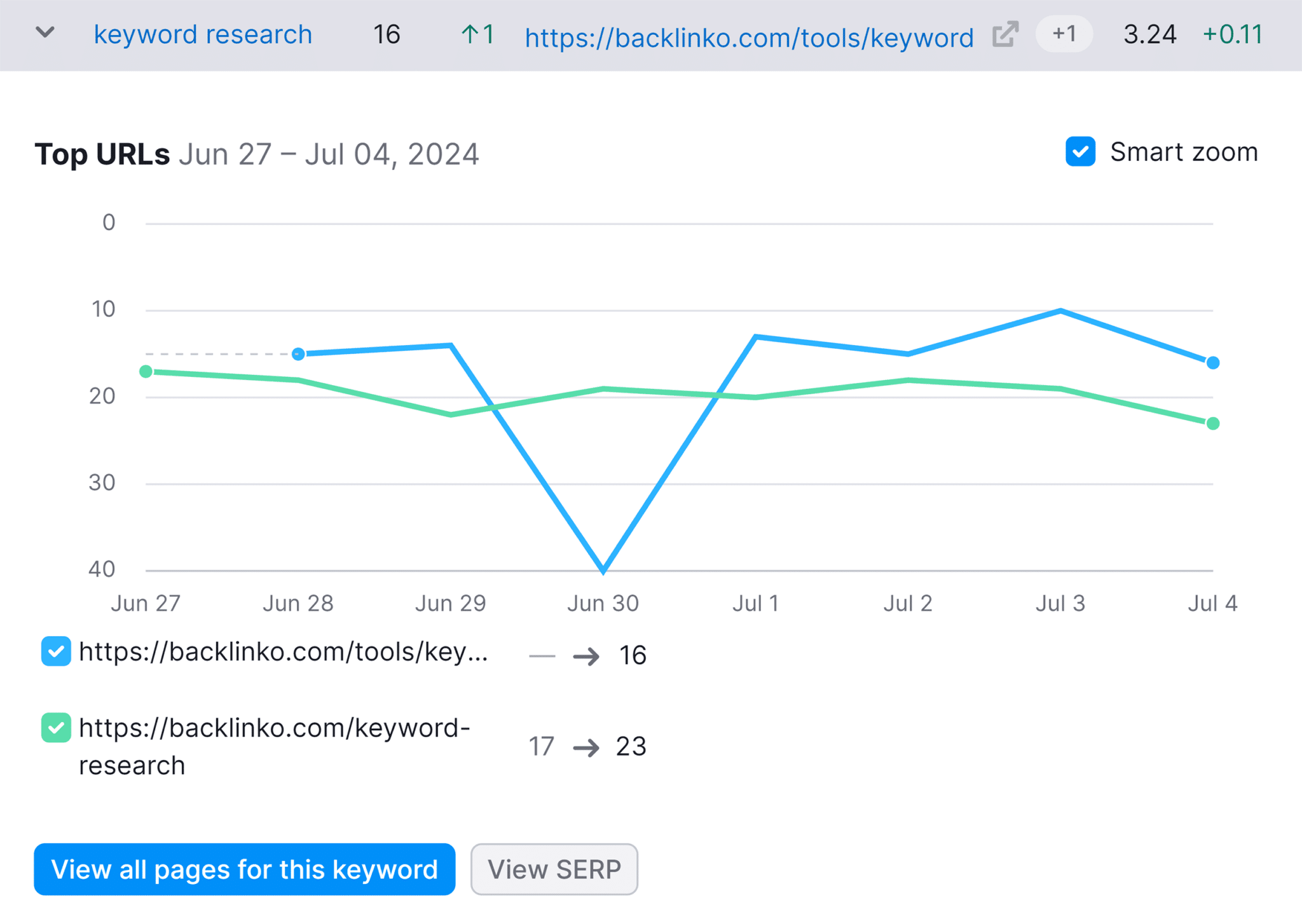
To accurately identify cannibalizing pages, review pages for each keyword and look at their search performance over the past few months.
Check whether any pages rank in the top positions and review each page’s monthly traffic.
If the search performance doesn’t look great, meaning low/fluctuating rankings and dipping traffic, you may be facing a cannibalization issue.
Site Search
You can also use a Google Site Search to identify cannibalization issues.
Use the search operator “site:[domain]” with any keyword to find all pages targeting this keyword.
Here’s how it works for the craft site Gathered:
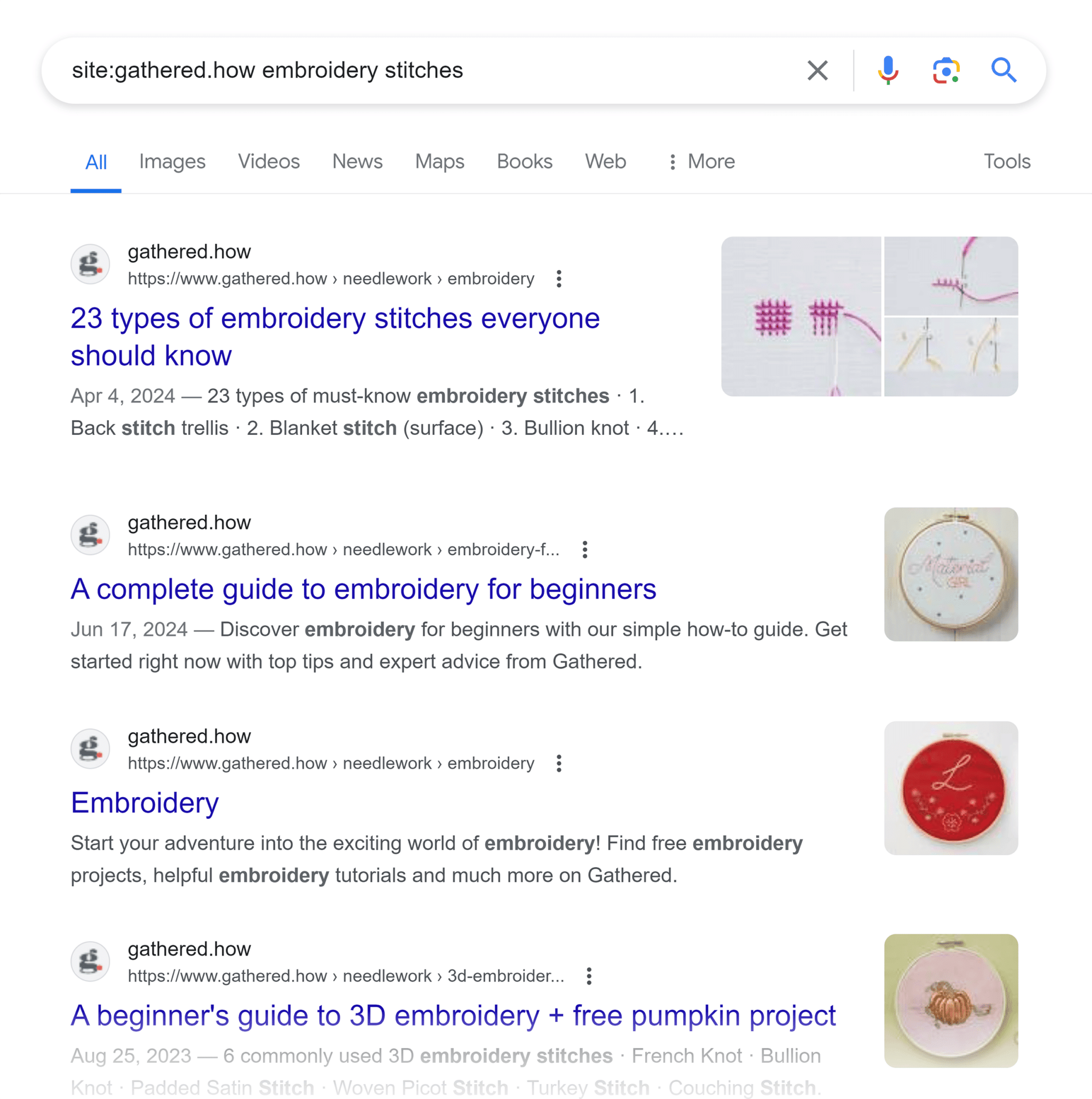
A site search will show all the pages containing even a single mention of the keyword you’ve searched for. This means you’ll need to manually review the list to identify relevant pages covering the same topic.
Then, review each of these pages to see if there’s a keyword and search intent overlap.
5 Ways to Fix Keyword Cannibalization
The diagnosis is in: Your website has cannibalizing pages.
What now?
The best starting point to solve keyword cannibalization is a comprehensive website audit. So, you can identify and address all cannibalizing pages at once rather than picking only a few issues at a time.
Each page will need a different solution based on its importance and intent.
Let’s look at five ways to fix cannibalization issues.
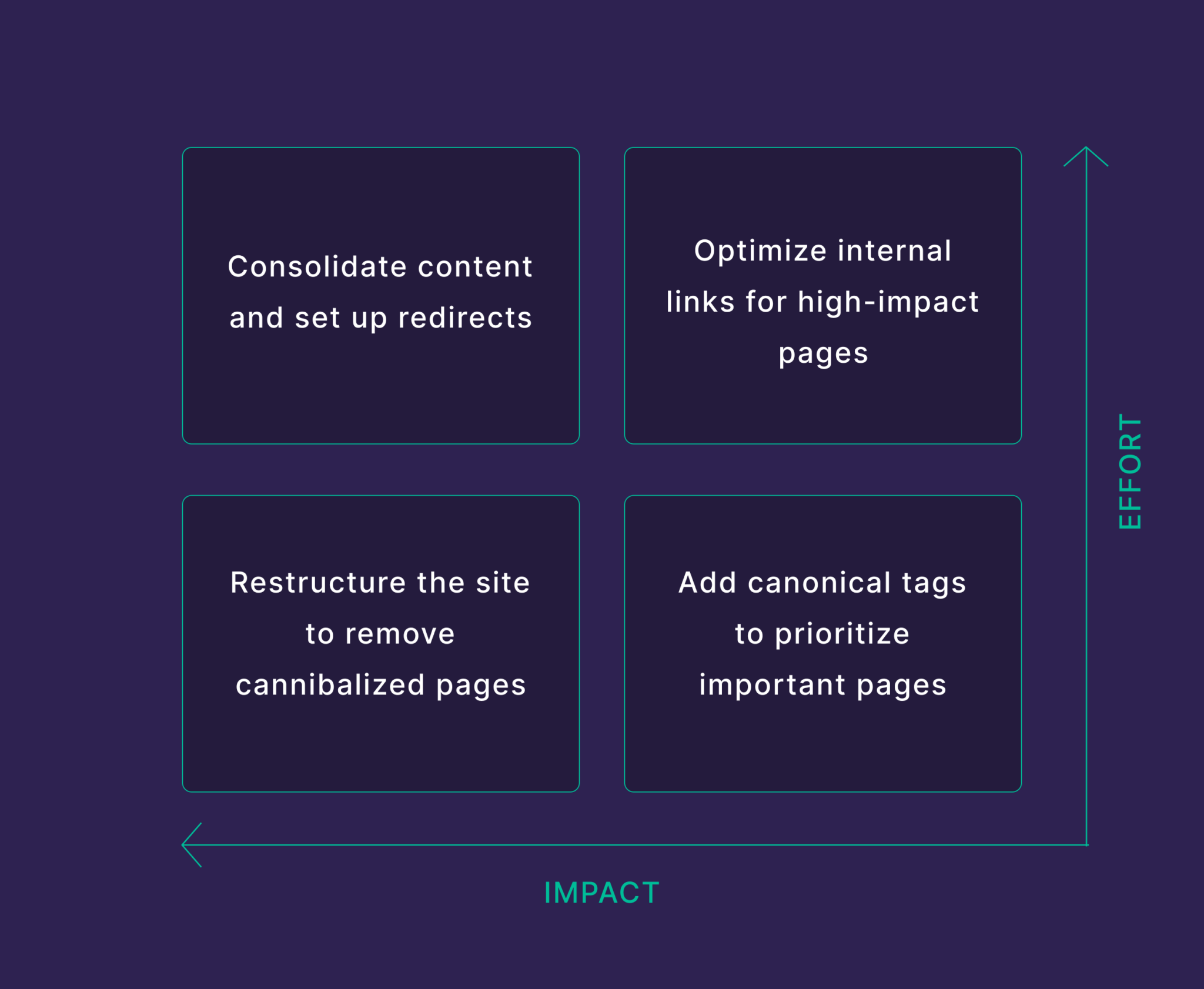
1. Consolidate Content and Set Up Redirects
One of the best ways to solve keyword cannibalization issues is by merging multiple pages into one comprehensive page.
You’re essentially replacing several low-authority pages with a single highly authoritative page.
You don’t have to create a brand-new page for this. Choose the best-performing page from your existing pages and revamp it.
But how do you find the best-performing page?
Go to Semrush’s Position Tracking tool and find the data on cannibalized pages. Pick the pages with the highest search positions.
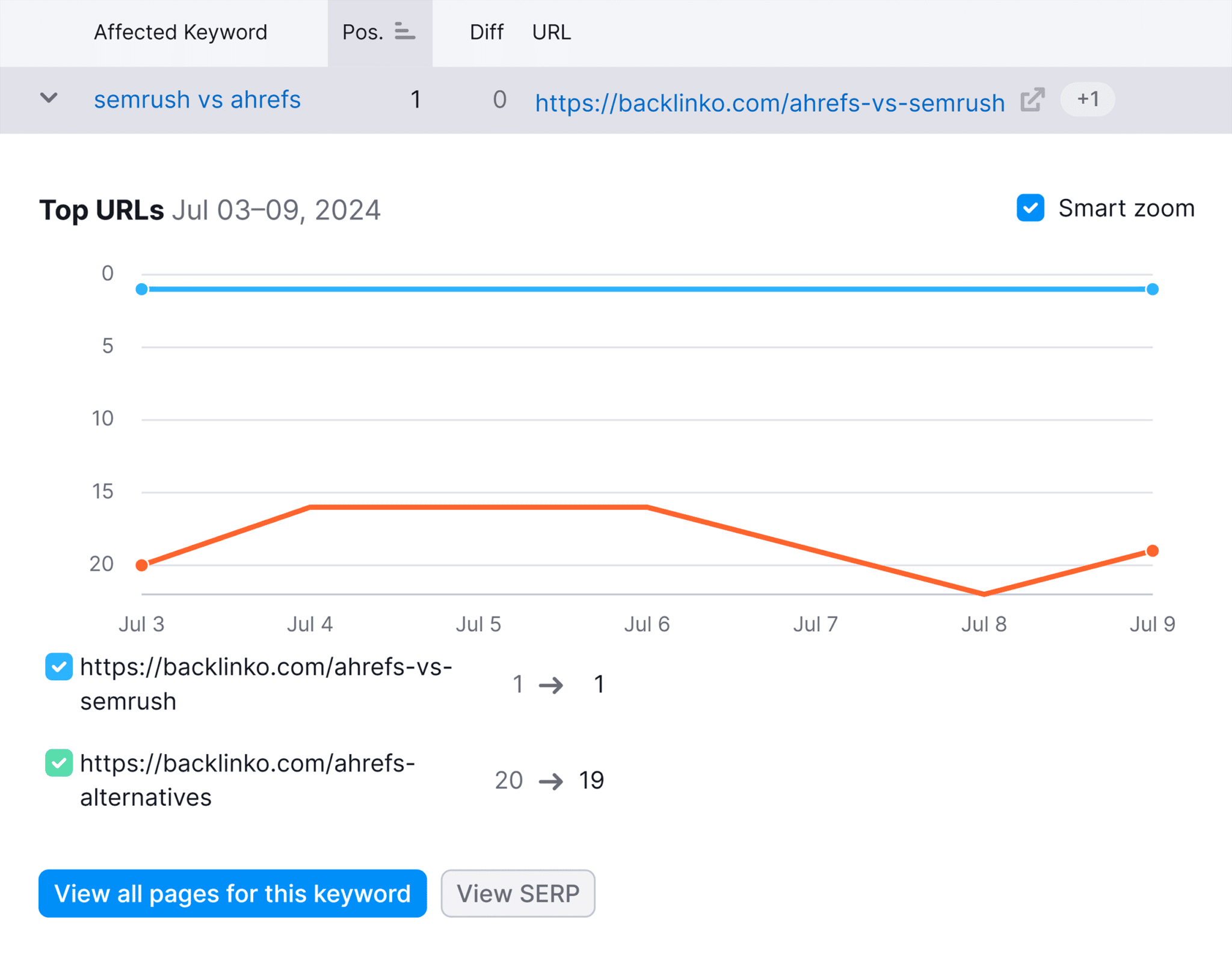
When consolidating multiple pages, you need:
- A clear structure of what you’ll cover
- Optimized meta title and description
- 301 redirects for all merged pages
Setting up redirects for all pages you’ve merged allows you to bring visitors to the page with the consolidated content.
Remember, each page needs high-quality, value-added content to outrank other high-ranking websites on the same topic.
Maximize page authority once your consolidated page is published by improving its backlink profile with internal and external links.
2. Target Different Search Intents on Each Page
If you don’t want to consolidate these pages, you can recreate the content for each page to cater to a different search intent.
This requires mapping each page to a defined purpose and revamping the content.
For example, if three pages are competing against each other for the same keyword, you can change the content to target different search intents:
- Informational intent: Share actionable knowledge
- Transactional intent: Help people make a purchase
- Commercial intent: Help with research before a purchase
- Navigational intent: Show up for a branded keyword
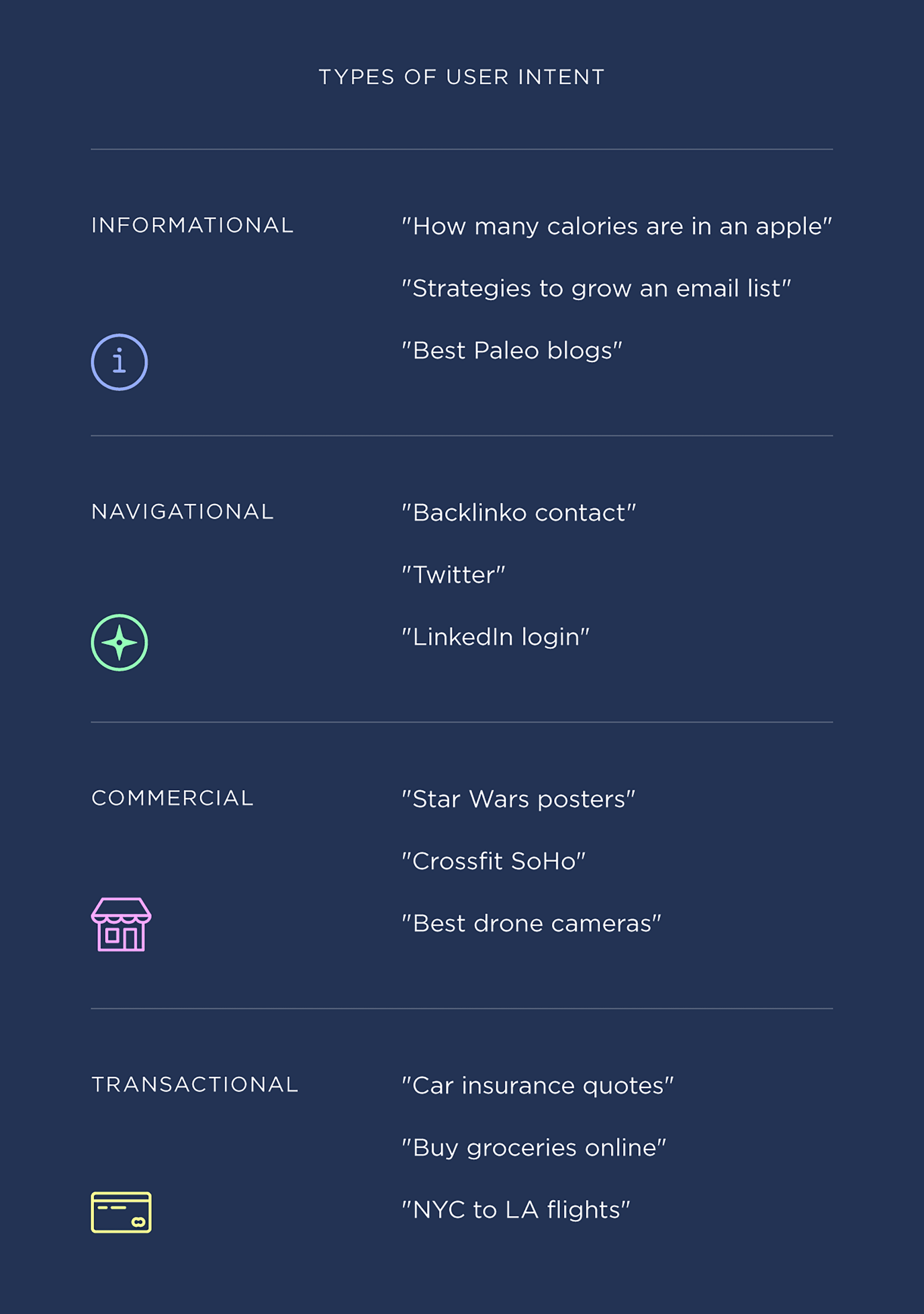
To better understand this solution, let’s consider that you have an ecommerce store selling footwear.
You’ve created multiple pages for the keyword “running shoes,” all targeting commercial intent.
Instead of merging these pages into one, you can differentiate each page with a unique search intent:
- Informational: An article on “How to Choose Running Shoes”
- Commercial: A buying guide on “Best Running Shoes for Flat Feet”
- Transactional: A product or category landing page for running shoes
The major heavy lifting here is defining a unique intent for each page and creating insightful content to fulfill this intent.
You can also optimize each page for multiple variations of the primary keyword. Use long-tail keywords, modifiers, and semantic variations to capture the specific intent.
3. Optimize Internal Links for High-Impact Pages
Internal links explain your site’s structure to search engines. The placement of these links tells search engines which pages are more and less important.
You can strategically use internal linking to increase the page authority for any cannibalized pages.
Here’s how:
- Identify the most important page from all the ones facing cannibalization for a keyword
- Add links to the important page from all the less important pages. This will tell search engines which page is the most relevant to rank for a keyword.
- Use descriptive anchor text to provide more context about the linked page
- Remove internal links to other pages with similar anchor text to prevent any confusion
We’re doing this for two Backlinko articles, which both rank for the keyword “backlinks.”
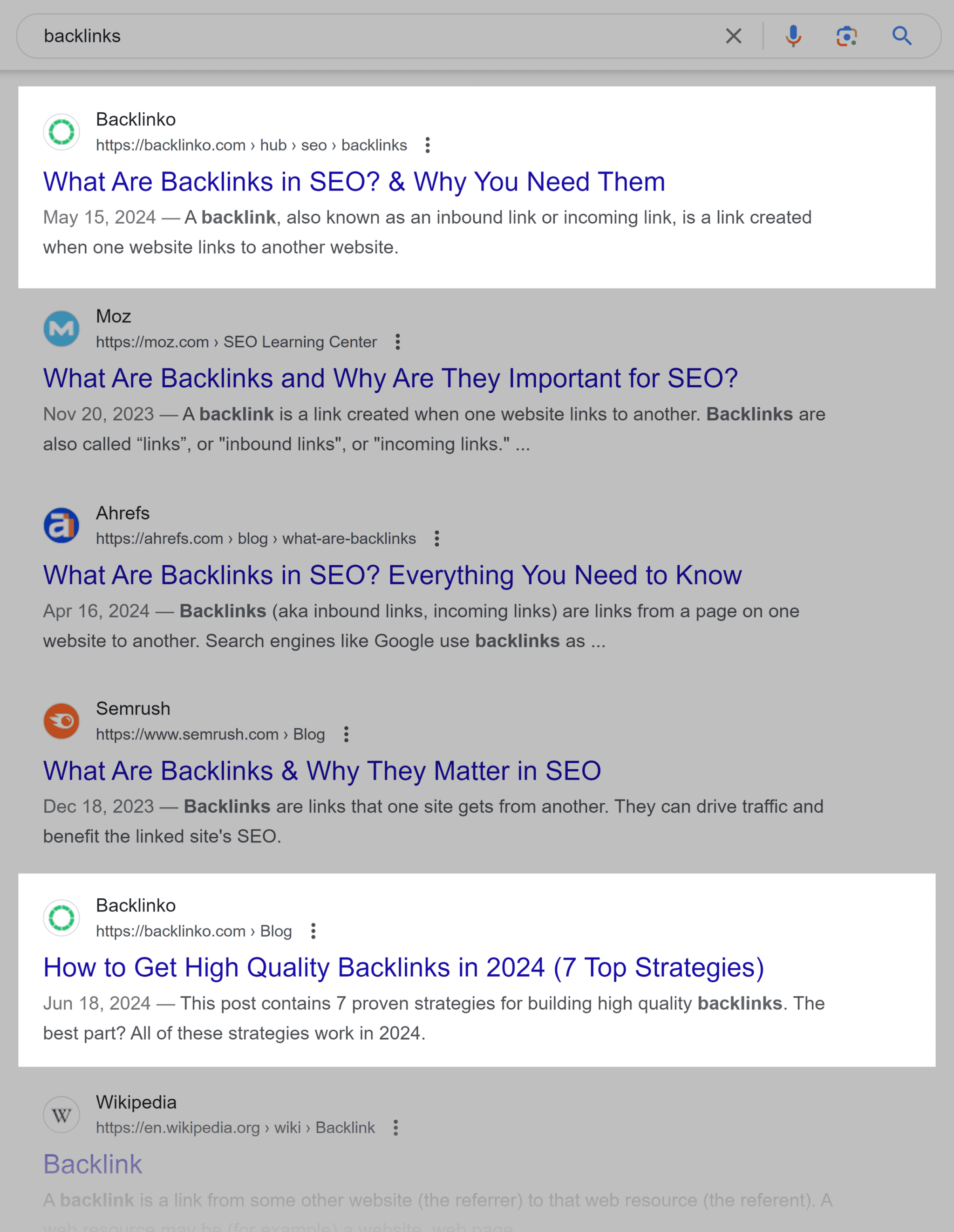
With the goal of getting the featured snippet, we’re cleaning up the internal linking structure to strengthen each page’s authority,
And we’re revising the content to target different search intents on both pages.
4. Add a Canonical Tag to Prioritize a Page
You might find duplicate content across cannibalized pages.
In such scenarios, you can use canonical tags to inform search engines about the preferred page to index and rank.
For example, if you have two articles on “How to Create a GPT” and “How to Make a GPT Quickly” with similar content, you can add a canonical tag to any one of these articles.

Search engines may prioritize the page with this tag and rank it above other pages targeting the same keyword.
But it’s best to revamp the content on these pages to prevent Google and other search engines from penalizing duplicate content.
5. Restructure the Site to Remove Cannibalized Pages
Removing or deleting pages isn’t an ideal solution for keyword cannibalization.
When you remove an indexed page, you lose all its backlinks and link juice. This means the authority this page passed on to other internally linked pages will also be lost.
It can also create broken links since the page doesn’t exist anymore.
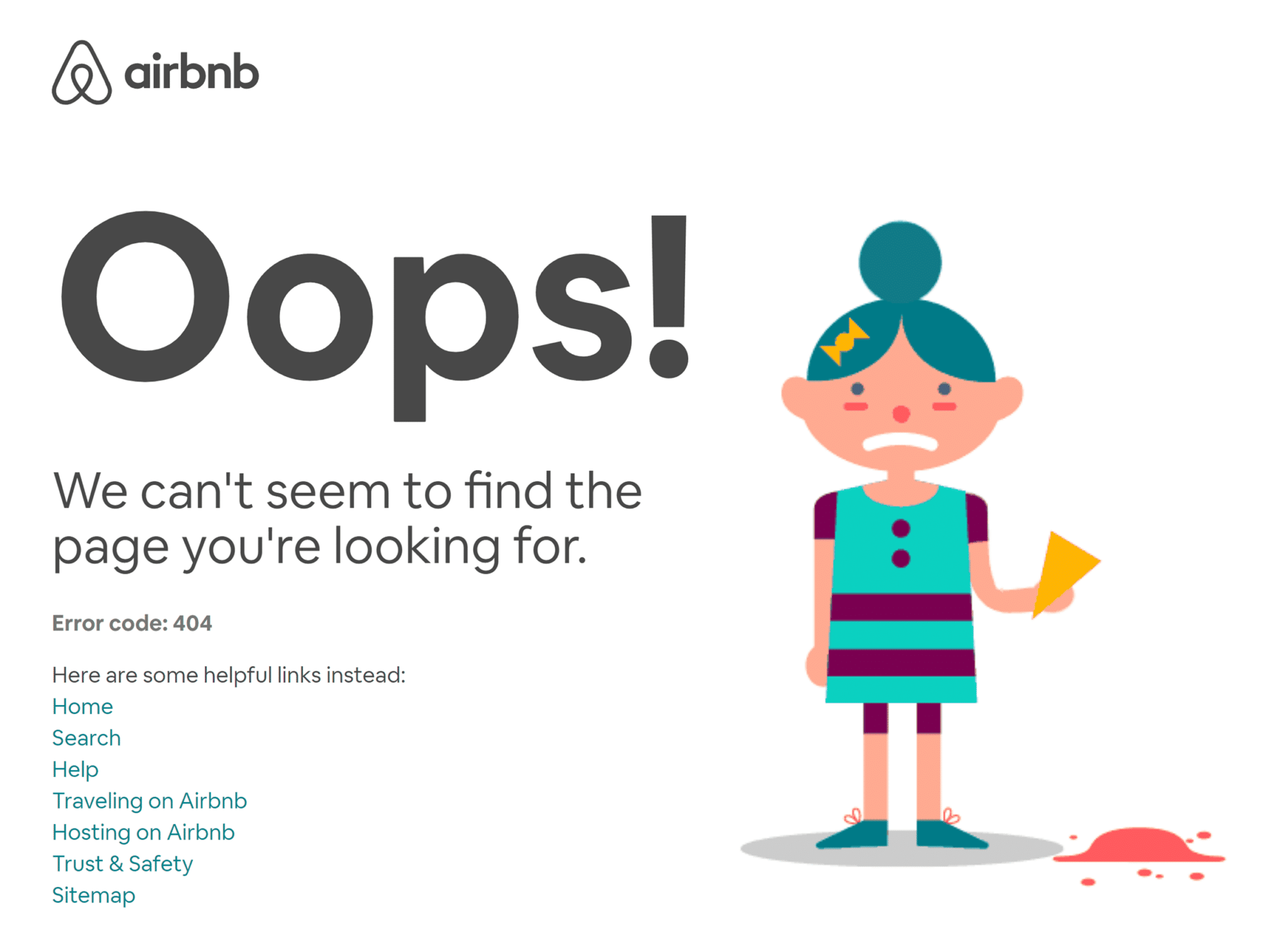
Only remove pages that no longer add value to your site. Otherwise, set up 301 redirects to guide visitors to a different page.
How to Prevent Keyword Cannibalization
Keyword cannibalization can gradually eat away organic traffic and reduce search visibility before you get to the bottom of the problem.
The more content you create, the higher the likelihood of keyword cannibalization.
But you can prevent these issues by following best practices for all new and existing pages:
- Create keyword clusters and map keywords for all website pages to ensure there’s no overlap
- Define a unique search intent for every page, especially when targeting similar keywords
- Strategically use internal links to build page authority and reinforce important pages
- Use SEO tools to stay on top of search performance and find pages at the risk of cannibalization
Fix Cannibalization to Enhance Your Search Performance
Keyword cannibalization can be a common challenge as your site grows and you create pages around similar topics.
But carefully planning your SEO efforts and conducting regular audits will help.
Start by building your keyword mastersheet using this keyword research template to strategically organize your keywords.
Then, regularly audit your site with an SEO tool to help increase your rankings and organic traffic.
Content Copyrights Belong to The Author. All Rights Reserved.
We're A Dallas Digital Marketing Agency That is Experts At Social Media Marketing, Website Design and Emarketing and Promotion.

